#property merging in pakistan
Explore tagged Tumblr posts
Text
0 notes
Text
Events 11.30 (after 1960)
1962 – Eastern Air Lines Flight 512 crashes at Idlewild Airport, killing 25 people. 1966 – Decolonization: Barbados becomes independent from the United Kingdom. 1967 – Decolonization: South Yemen becomes independent from the United Kingdom. 1967 – The Pakistan Peoples Party is founded by Zulfikar Ali Bhutto, who becomes its first chairman. 1967 – Pro-Soviet communists in the Philippines establish Malayang Pagkakaisa ng Kabataan Pilipino as its new youth wing. 1971 – Iran seizes the Greater and Lesser Tunbs from the Emirates of Sharjah and Ras Al Khaimah. 1972 – Vietnam War: White House Press Secretary Ron Ziegler tells the press that there will be no more public announcements concerning American troop withdrawals from Vietnam because troop levels are now down to 27,000. 1981 – Cold War: In Geneva, representatives from the United States and the Soviet Union begin to negotiate intermediate-range nuclear weapon reductions in Europe. (The meetings end inconclusively on December 17.) 1995 – Official end of Operation Desert Storm. 1995 – U.S. President Bill Clinton visits Northern Ireland and speaks in favor of the "Northern Ireland peace process" to a huge rally at Belfast City Hall; he calls IRA fighters "yesterday's men". 1999 – Exxon and Mobil sign a US$73.7 billion agreement to merge, thus creating ExxonMobil, the world's largest company. 1999 – In Seattle, United States, demonstrations against a World Trade Organization meeting by anti-globalization protesters catch police unprepared and force the cancellation of opening ceremonies. 1999 – British Aerospace and Marconi Electronic Systems merge to form BAE Systems, Europe's largest defense contractor and the fourth largest aerospace firm in the world. 2000 – NASA launches STS-97, the 101st Space Shuttle mission. 2004 – A McDonnell Douglas MD-82, operating as Lion Air Flight 538, overran the runway and crashed, killing 25 people. 2005 – John Sentamu becomes the first black archbishop in the Church of England with his enthronement as the 97th Archbishop of York. 2018 – A magnitude 7.1 earthquake with its epicenter only 24 km from Anchorage, Alaska causes significant property damage but no deaths. 2021 – Barbados becomes a republic. 2021 – A 15-year-old gunman murders four students and injures seven people, including a teacher, in a mass shooting at Oxford High School in Oxford Township, Michigan. 2022 – The AI chatbot ChatGPT is launched by OpenAI.
0 notes
Text
Luxury Wooden Hot Pot
A Testament to Pakistan’s Artisanal Heritage with Crafts Emporium:
Amidst the rich cultural landscape of Pakistan, where age-old traditions merge seamlessly with contemporary innovation, the wooden hot pot stands out as a symbol of craftsmanship and heritage. Crafts Emporium invites you to explore this remarkable piece that embodies the essence of Pakistani artistry. Delve into a world where each creation tells a story of skill, passion, and cultural pride. Shop our curated selection of Pakistani handicrafts online and bring a piece of timeless beauty into your home.
Tradition and Functionality:
The Wooden Hot Pot is not just a utilitarian kitchen item; it is a work of art that showcases the intricate craftsmanship of Pakistani artisans. Designed to keep food warm, it combines functionality with aesthetic appeal. These hot pots, often made from premium woods like Sheesham (Indian Rosewood), are carefully crafted to retain heat while adding a touch of elegance to your dining experience.

The Craftsmanship Behind the Wooden Hot Pot:
Creating a wooden hot pot is a meticulous process that starts with selecting the finest quality wood. The wood is chosen not only for its heat-retaining properties but also for its durability and natural beauty. Skilled artisans then shape the wood, using traditional tools and techniques passed down through generations.
The design of each wooden hot pot often features intricate carvings and detailed inlays, reflecting the rich cultural heritage of Pakistan. Floral patterns, geometric designs, and cultural motifs are commonly used, each telling a unique story. The inside of the pot is typically lined with metal to enhance its heat-retaining capability, ensuring that your meals stay warm for longer periods.
Celebrating Artisanal Excellence:
At Crafts Emporium, we are committed to celebrating and preserving the rich heritage of Pakistani craftsmanship. Our curated selection of wooden hot pots showcases the finest examples of this artisanal excellence. By working directly with skilled artisans, we ensure that each piece in our collection is a true representation of their skill and dedication.
Our collaboration with artisans ensures that they receive fair compensation for their work, supporting their communities and encouraging the continuation of these traditional crafts. Each purchase from Crafts Emporium is not just an acquisition but a contribution to preserving Pakistan’s cultural legacy.
Bringing Heritage into Your Home:
When you introduce a wooden hot pot from Crafts Emporium into your home, you are not just adding a functional kitchen accessory; you are embracing a piece of Pakistani heritage. These hot pots are perfect for family gatherings, festive occasions, or simply for adding a touch of elegance to everyday meals. They serve as conversation starters, highlighting the beauty and craftsmanship of Pakistani artisans.
Conclusion:
The wooden hot pot is a beautiful blend of tradition and innovation, a practical item that also serves as a piece of art. Each hot pot from Crafts Emporium tells a story of dedication, skill, and cultural pride, making it a perfect addition to any home. By exploring our curated selection of Pakistani handicrafts, you can bring a piece of this rich heritage into your own space.
Discover the heart of Pakistan’s artisanal heritage with Crafts Emporium. Let each wooden hot pot be a testament to the enduring spirit of Pakistani artisans, and let your home reflect the timeless beauty of their craft. Shop our collection today and experience the elegance and functionality of these exceptional pieces.
To view or order additional luxury wooden hot pot, please visit our collection. Click Me
0 notes
Text
Summer Tracksuits
Provoke
Unisex Tracksuits- Get export quality tracksuits on amazing discounts, branded and winter tracksuits, we offer the best Nike - Silver Color Polyester Track Suit in Pakistan.
Top Unisex, Winter & Polyester Branded Tracksuits- Provoke.pk
Discover the epitome of comfort and style with our premium tracksuits at Provoke.pk. We bring you a diverse collection of tracksuits designed to elevate your activewear game. Whether you're hitting the gym, going for a run, or simply seeking a stylish yet cozy outfit, our tracksuits are the perfect choice. Let's delve into our selection and find the tracksuit that resonates with your personal style.
Unmatched Comfort:
Our tracksuits are meticulously crafted with the finest materials to provide unparalleled comfort. The soft, breathable fabrics ensure that you can move freely while maintaining a comfortable body temperature. Whether you're engaging in an intense workout or simply lounging, our tracksuits offer a luxurious experience that your body truly deserves.
Contemporary Style:
At Provoke.pk, we understand that style is just as important as comfort. Our tracksuits feature contemporary designs that effortlessly merge fashion and functionality. From sleek monochromes to bold patterns, our collection caters to diverse style preferences. Whether you prefer a minimalist look or want to make a statement, our tracksuits have got you covered.
Versatile Performance:
Our tracksuits are engineered to keep up with your active lifestyle. The moisture-wicking properties ensure that sweat is effectively managed, keeping you feeling fresh throughout your activities. The ergonomic design and stretchable fabric allow for unrestricted movement, making these tracksuits ideal for any workout or outdoor adventure.
Tailored Fit:
We understand that the right fit makes all the difference. Our tracksuits are available in a range of sizes to ensure that you find the perfect fit for your body type. The tailored fit not only enhances your appearance but also boosts your confidence as you conquer your fitness goals or embark on your daily routine.
Quality Assurance:
At Provoke.pk, quality is non-negotiable. Each tracksuit is crafted with attention to detail, reflecting our commitment to excellence. Our tracksuits are designed to withstand the test of time, maintaining their comfort, style, and functionality even after multiple wears and washes.
Conclusion:
Elevate your activewear collection with our premium tracksuits that strike the perfect balance between comfort and style. Provoke.pk brings you a range of tracksuits designed to enhance your active lifestyle. Experience unmatched comfort, contemporary style, and versatile performance with our meticulously crafted tracksuits. Browse our collection today and discover the ultimate tracksuit experience.
All Type Clothing:-
Gym wear Tracksuits
Tracksuits for Boys
Tracksuits for Girls
Tracksuits for women
Polyster Tracksuits
Branded Tracksuits
Winter Tracksuits
Unisex Tracksuits
Summer Tracksuits
Twinsets For Girls & Boys
More Info:-Provoke.pk
0 notes
Text
FOMA 37: Forgotten Greece
Forgotten Greece Masterpieces are obscure and understated, but still special in their own subtle way: it is the lack of fanfare, a certain restraint in the architecture that accentuates their genuine character, therefore they merit a closer look.
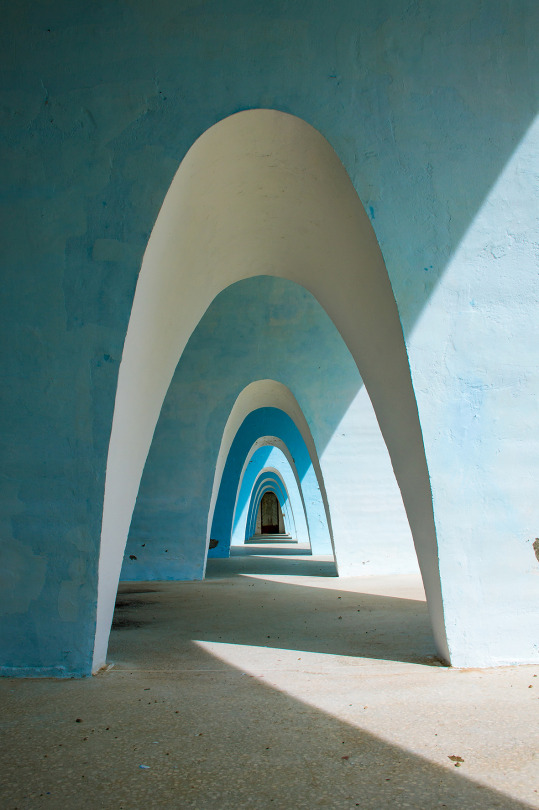
Concrete arches of Magoula Cemetery emanate an aura of Aalto’s wave designs or elements of Niemeyer’s Brasilia | Photo by Exporabilia
Each space comes with an interesting backstory and an evidence of how post-war ambition and civic pride fuses with classical tradition, science, folklore, religion and the natural environment. There is also an evidence of architectural brilliance mired in political persecution, indifference, schadenfreude or a lack of recognition by the establishment. Such storylines are as quintessentially Greek as drama and each might weave their unique pattern into the architecture.
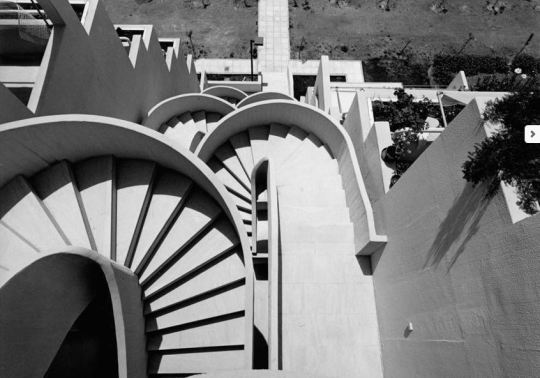
Aspra Spitia is a settlement to house employees of the Aluminum of Greece factory and mining operations west of Athens. | Photo via Fotiadis
Greeks demonstrated an innate affinity for siting and orientation since their temple building days of antiquity. Stillwell (1954) describes a mastery of form, angle, height and orientation: their temples were a planned succession of experiences that culminated into a grand, final approach of the cult image. Temple construction was an early use of architecture and urban planning principles to deliver a coherent visual and emotional result - exempli gratiaa transcendental, religious experience.
youtube
In post-war Greece, architect and urban planner Constantinos Doxiadis drew inspiration from the same fountain of knowledge. He created a seminal worker’s settlement that both transcended the provincial vernacular andchimed in fascinating consonance with its natural surroundings. It is like a place of eternal youth by design like Logan’s Run Caroussel), where residents never get to grow too old.
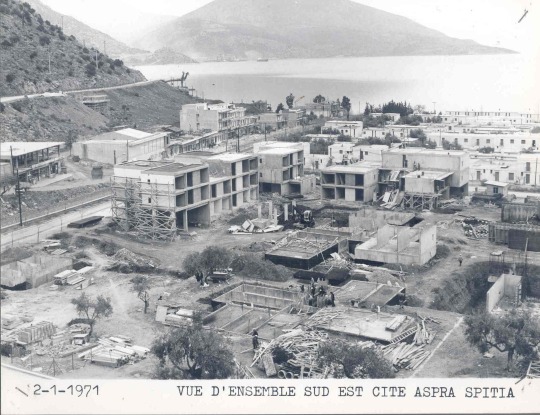
The construction phase on of Aspra Spitia. | Photo via © Doxiadis

Through Ekistics, Doxiadis approached settlements as complex biological organisms. | Photo via Voiotias
Aluminum of Greece was launched in 1960 as a joint venture between the government of Greece and an industrial conglomerate led by the historic French firm Pechiney, a world leader in aluminum manufacturing. As a result, the first aluminum production facility in the country opened on the northern coast of the Corinthian Gulf in 1966. Capitalising on the nearby bauxite ore mines (one of the largest deposits in Europe), the vertically integrated manufacturing process ranged from raw material extraction to the delivery of a range of secondary bauxite and aluminium by-products. It was an ambitious and successful industrial project that created new opportunities for employment for those prepared to settle there. The sheer scale of the industrial unit and its ancillary facilities, however, created an urgent need for housing the employees, prompting the creation of a new settlement nearby. They called it Aspra Spitia (White Houses), and to this day, it remains a model for small scale urban planning with a unique blend of Modernist yet distinctively traditional Greek aura.

Constantinos Doxiadis in 1975
The urban planning, layout and design of the settlement was masterminded by Constantinos Doxiadis and his associates, who also delivered the first phase of the project. Doxiadis, an experienced urban planner who held various Public Works related government posts for the Greek government between 1937 and 1951, was a leading figure in the country’s post-war reconstruction effort. His private practice has been rising in international prominence since it was founded in the early 1950s; by 1959, he was appointed as chief urban planner for the city of Islamabad, Pakistan, while his firm was involved in numerous local and international projects, prompting him to construct a new headquarters in Athens to house their now 400 strong team of urban planners, architects, and engineers.
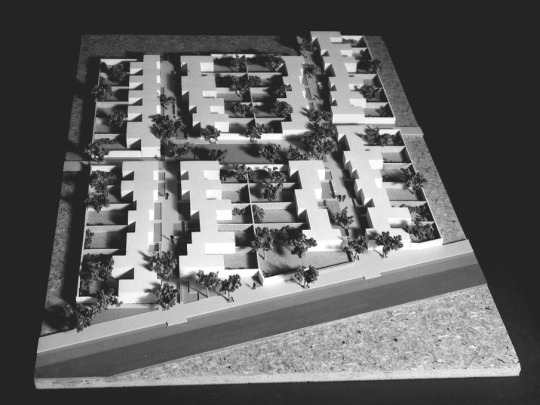
The model for Aspra Spitia. | Photo via © Doxiadis.org
Still, Aspra Spitia was a challenging brief: there was nothing but olive trees and a few vernacular shacks inside the tiny seaside valley. The first wave of French engineers settling at the newfound community were disheartened: this rugged slice of paradise had yet little to show in the way of creature comforts. And there was a looming danger in choosing to deliver a typical, prefab industrial settlement, with identikit housing units built around amenities: that choice of plan was expected to mark the marvellous landscape irreparably, presenting an unsuitable urban continuation of the industrial landscape at the nearby factories and mines. The new resident workers might feel disconnected, transient, and without a sense of belonging to the very habitat they might end up spending their entire career.
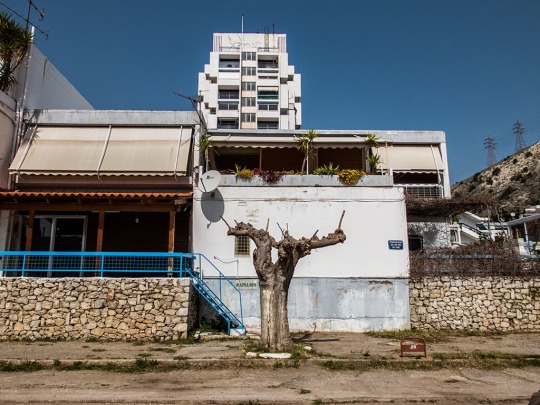

A commercial centre Tower | Photo via © astronayths.blogspot.com
However, Doxiadis had a clear vision about Aspra Spitia. His plan was informed by his Ekistics philosophy, first proposed in 1942 and constantly developed since. Through Ekistics, Doxiadis approached human settlements as complex biological organisms - capable of forming connections with each other, constantly evolving, merging and scaling in orderly harmony with the natural environment. And preserving the purity and beauty of the hills, the seafront, and the olive tree fields within the planning scope of a factory, mines and a worker’s settlement at Aspra Spitia became a key challenge. These very different, both natural and man-made constituent units demanded to be re-shaped into a natural fit. This wouldn’t be about forcing an irreverent, modern smudge in the landscape: it’d be about the foundation of an orderly, organic urban environment.

A corner unit of the Phase 1. | Photo via © astronayths.blogspot.com
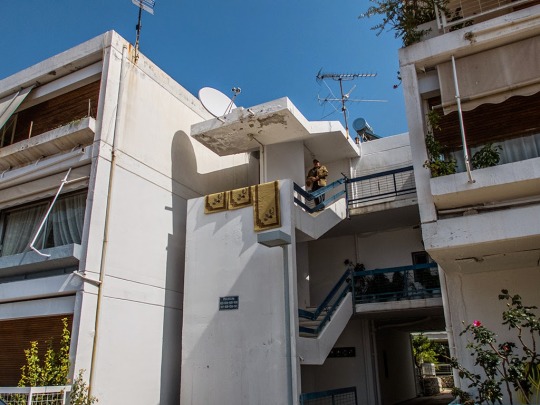
Stairs from the Phase 2. | Photo via © astronayths.blogspot.com

Units from the Phase 2. | Photo via © astronayths.blogspot.com
Thankfully, Doxiadis’ Ekistics already proposed such a scalable hierarchy for ordering urban settlements – an arrangement that social and biological sciences concluded was important for the avoidance of chaos. And at the beginning of the scale, there was Anthropos – the individual. It was expected that the aluminium workers would be mostly recruited from the nearby rural areas. Therefore, understanding the familiar traditions those new settlers were expected to carry with them was a crucial design element, as well as preserving the individuality of each constituent unit: each house, each cluster, each neighbourhood had to feel fresh and special, but still flow with identifiable tradition and heritage, also retaining a degree of deference to the natural environment. And the whole ensemble needed to remain functional for its intended purpose, without reverting to picturesque anachronisms.
All these elements were carefully infused into the inverse L-shaped city plan, which follows the organic contour of the landscape closely: The long leg is flanked by hills, while the short leg is laid across the seafront. Within the resulting space, four neighbourhoods were created, each circled by a peripheral road. The civic, business and administrative forum of the city is located at the junction of the legs, while a recreation and tourism area is laid along the seafront.
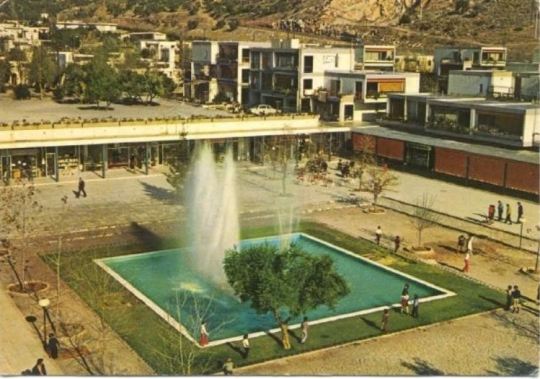
The settlement’s main square.
The design of the residences and public spaces is where it all comes together. Twelve unique house designs were utilized, each standardized with interchangeable elements that enabled the architects to alter the design in intermediate stages of construction. This technique increased the resulting variety of house types to twenty-five, while further variations were achieved by mixing-up the properties of each street in terms of house orientation, elevation, set back, and corner placement. Therefore, each home and each neighborhood look unique, but also retains a thematic familiarity with the whole ensemble of the town.
Both natural and modern materials are utilized, concrete, wood and local stone. The walls and stone are mostly whitewashed, offering a traditional Greek visual clarity to the settlement. Some stone walls remained natural with intent, in cases where these blended visually with the surrounding olive groves. The preservation and integration of existing olive trees in squares, yards and street layouts was prioritised, and supplemented by re-planting as well as new plantings. Stone fences, pergolas, steps and pavements complete the textured landscaping of each neighborhood, while well placed cul-de-sacs, squares and public thoroughfares complete the harmonious balance of private and public spaces.
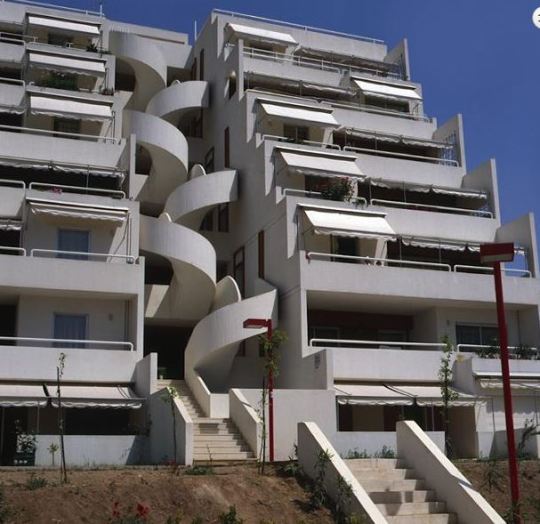
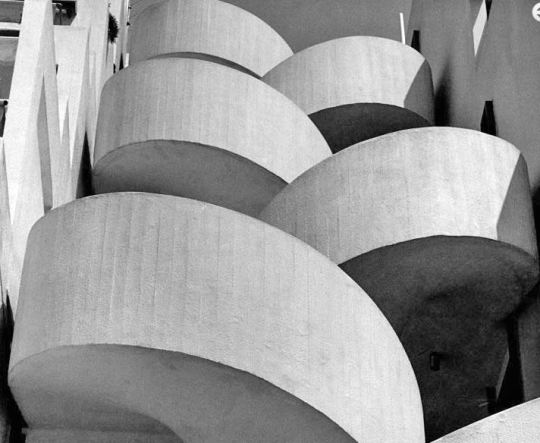
Stairs from the Phase 3. | Photo via © Photiadis.gr
Aspra Spitia was completed in three phases, and now boasts 1072 residences housing approximately 3.000 residents. After the completion of the first houses and amenities by Doxiadis Associates, the city expanded both vertically and aesthetically with additions by C.Lembessis, P.Massouridis and M. Photiadis. A series of high rise, larger apartment blocks as well as specific amenities for the individual needs of the workers and the families were erected. These include a business centre, a nursery, and even a Catholic church for servicing the religious needs of the French settlers. One of the most ground breaking amenities was the installation of a sewage water treatment plant, which was the first of its kind in Greece at the time.

A series of specific amenities for the individual needs of the workers and the families were erected, like the nursery. | Photo via © Photiadis.gr
In terms of administration, Aspra Spitia is not far from the purpose-built, model socialist towns of the former Eastern Block. The settlement belongs to Aluminium of Greece (AL), and working in the mines or factories is a prerequisite for obtaining a house or a flat. A point system exists to help fulfil housing needs accurately, allocating the right type of property per household size. Residents are only required to pay a token monthly rent, while all property maintenance and upkeep is handled by the company. Naturally, these privileges last only for the duration of employment. Workers who wish to move on to another company or reach retirement age aren’t eligible to stay anymore: they are required to vacate their house, after making all necessary alternative arrangements. This is a town where people are not expected to grow old, and the reason why a cemetery was never planned as part of the urban grid (the nearest ones can be found in surrounding villages).
If Ekistics is about approaching urban environments in biological terms, then Aspra Spitia possibly holds the secret for urban immortality: free from the mortal vestiges of permanence and ownership, this is a model town that is, and will remain as fresh and tidy as planned over half a century ago.
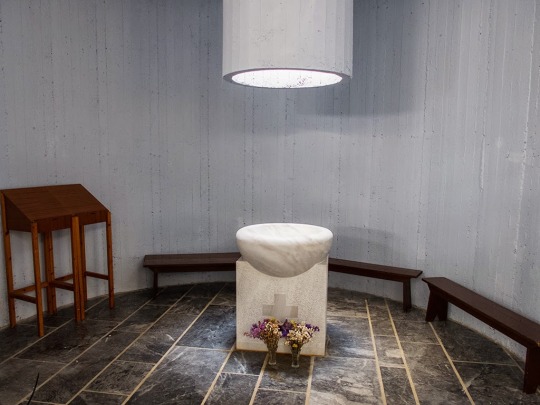
The Church. | Photo via © astronayths.blogspot.com
The next stop is a few miles across the water from Aspra Spitia, where a forgotten Isthmia Prime Motel presents an abstract expression of three Classical disciplines: architecture, mathematics and music.
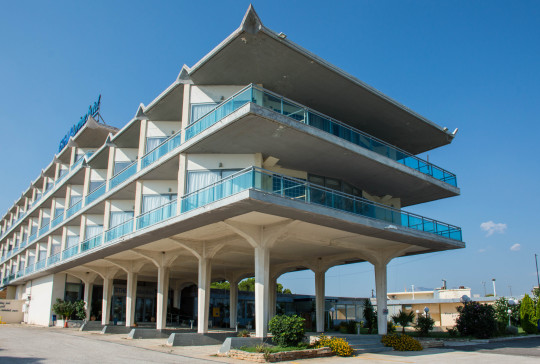

The unassuming roadside motel by the Isthmus of Corinth is an intriguing cross between Brutalism and the Classical Orders. | Photo by © Exporabilia
In its heyday, the main motorway linking the greater metropolitan area of Athens to the city of Corinth in the south west was one of the busiest arteries in Greece's road network. Built between 1960 and 1969, the motorway would hug the craggy cliffs outside the capital with its narrow ledge, offering breath-taking, and somewhat dangerous views of the sea below. Vehicles would naturally slow down at the Isthmus of Corinth, the canal that allowed shipping to navigate the strip of land connecting the Peloponnese to Attica. The slow crossing of the Isthmus Bridge enabled passengers to admire the view of the man-made chasm below, and traditionally led to a quick pit stop on the other side of the canal.
The Isthmus region was becoming a very popular weekend escape with Athenians post war. At about one hour drive from the capital, it was near, yet far enough to enjoy the sea and fresh air. Small villas and seaside hotels sprang out in local villages and hamlets for weekenders to escape the hustle and bustle of a rapidly urbanizing Athens.
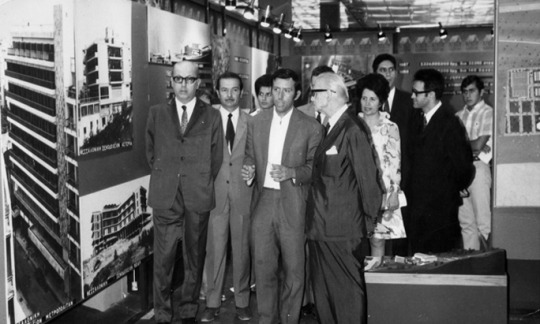

Panos Spiliotakos presenting his work. | Photo via © ema-arch.com
It is at this popular stopover area past the canal, where the strangely alluring hotel was built in 1969 in a collaboration between composer Iannis Xenakis and urban planner Panos Spiliotakos, two visionary friends expressing their common architectural heritage.


Iannis Xenakis | Photo via © Adelmann Collection of Françoise Xenakis
Xenakis was perhaps the most well-known of the duo. He was a Greek multidisciplinary artist with a passion for music and engineering and an unquestionable aptitude in both. He survived the war suffering a terrible face wound - caused by shrapnel from a shell fired by a British tank into a crowd of Communist protesters demonstrating in the streets of Athens in December 1944. As a qualified engineer, he left for Paris in 1947 where he worked under Le Corbusier at the Unite D'Habitation and Convent De La Tourette.

Le Corbusier with Iannis Xenakis. | Photo © Iannis Xenakis
During that period, and through his own musical culture, Xenakis soon realised that the same complex spatial geometrical patterns applied in Le Corbusier's architecture - the structural calculations, the intersecting tones and curves - could be applied to the composition of music too. His seminal 1955 musical work Metastaseis (lit.transmutations) was inspired by Einsteinian ideas about time and space, and utilised the mathematical principles of the Fibonacci sequence and the Golden Section structured around Le Corbusier's architectural calculations. It shocked the world of contemporary music at the time: this was original Brutalist music, with all the sonic cantilevers, rebar and board marking you could handle.
youtube

The Algorithmic Compositions of Metastaseis
Xenakis' knowledge of architecture allowed him to use graphic notation to represent his music. The string glissandi and other musical motions of his piece, representing sonic beams with time on one axis and pitch on another, looked less like sheet music, and more like a blueprint. With Le Corbusier occupied in the construction of Chandigarh in India, Xenakis went on to design the Phillips Pavilion in Brussels Expo 58 on his behalf. It's a unique marriage of music and architecture, with its hyperbolic paraboloid masses deriving from the musical landscape of his own Metastaseis.
Inside the Pavilion, an expansive array of speakers and dials were arranged in an acousmonium: an avant-garde playback device used to spatialize musical scores. The array had been invented in the 1940s by proponents of musique concrète, an experimental circle of composers with whom Xenakis was associated. Further musical scores by Xenakis and Edgard Varese were performed this way throughout the pavilion, creating a unique meta-experience that fused architecture and music like never before.
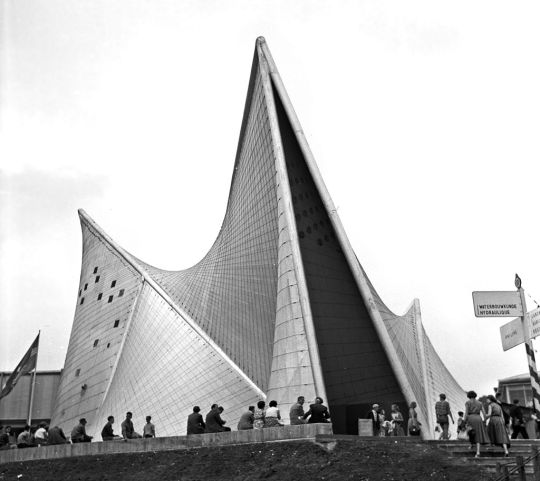
The Phillips Pavilion in Brussels Expo 1958. | Photo © Wouter Hagens
True to the genius of Iannis Xenakis, the building by the Corinthian Isthmus emanates a classical aura throughout. Built as a modern diversorium (a roadside inn), it reflects the long Graeco-Roman resort heritage of the area. The sulphur baths at nearby Thermae (today's Loutraki) attracted visitors since the antiquity. Many classical villas and baths have been discovered in the region through the years. It makes perfect sense that Isthmia Prime's characteristic main entrance colonnade is made of 12 stern, board-marked concrete columns, a Modernist throwback to the Doric order of the nearby Temple of Apollo. The colonnade is supporting the 3-storey main residential block, with the rooms arranged obliquely to the main axis to maximise the beautiful views of the Gulf of Corinth beyond.

The colonnade is supporting the 3-storey main residential block, with the rooms arranged obliquely to the main axis. | Photo by Exporabilia
The triangular concrete antefixeson the flat roof is another wink to the floral anthemiaof antiquity, the decorative palmettes that adorned the eaves of ancient Greek and Roman buildings. The block is intersected by the reception and services area at ground level, allowing for a practical green area at the front with a star shaped pond. Iannis Xenakis reminded us that rhythm, as symmetrical repetition, is the ancient, supernatural bond that links mathematics, music and architecture. Isthmia Prime is an elegant, if somewhat forgotten example of these classical and artistic traditions, fused expertly together with his characteristic elan.
The building at Corinth is a Modernist throwback to certain familiar artistic traditions of Classical antiquity. At the corollary of this Athenian-centric luminary ethos, there’s a counterpart a Spartan-centric ethos, founded on the principle of selfless sacrifice as the pinnacle of civic achievement. Naturally, there’s less opportunity to go down fighting under a hail of arrows in our day. But dedicating one’s life in the service of the state is here presented as a visual metaphor of Sparta’s finest traditions in the Modernist Necropolis of Magoula.

The waveform of the Magoula Cemetery is symbolic of the up's and downs we go through life. | Photo by Exporabilia
The new city of Sparta was founded in 1834 at the behest of Otto, the Bavarian prince who became the first King of Greece in the aftermath of the nation’s successful war of independence. He embarked on a revivalist program that aimed to modernize and urbanize Greek towns. The project was led by Eduard Schaubert,a Prussian architect and topographer who studied under Karl Friedrich Schinkel in Berlin’s Bauakademie. Schaubert also re-designed Athens, Pireaus and other major Greek cities, finely tuning their plethora of Classical and Byzantine sites with the Neoclassical neighborhoods, squares, and administrative buildings that typified the Greek national revival. This is how Sparta, previously obliterated by the Goths in the 4thcentury, was restored by royal decree in 1837. The re-established Sparta became, in fact, the first of the new Greek towns whose design was based on an actual urban plan – thus breaking with the disorderly, vernacular yoke of medieval urban spaces.
A century later, Sparta remained a quaint agricultural town, virtually unchanged since Schaubert planned it. The beautiful neoclassical facades were crumbling, and the street grid had deteriorated and was unsuitable for the ever-increasing motor vehicle traffic. The sewage system was old, and problematic. What’s more, modern Sparta was a city with a distinctive lack of modern facilities and monuments – it was becoming lethargic, almost as if the Goths had somehow travelled forward in time, sacking it again into oblivion.

There are entrances to either end of the arches, one leading to a small functions area, and another to the ossuary. | Photo by Exporabilia
The man who changed all that was Georgios Sainopoulos, the philanthropist who became mayor of Sparta for two terms, over a period of 8 years between 1964 and 1978 (interrupted by the Colonels’ Junta, who ousted him between 1967 and 1974). Sainopoulos dedicated his life to the improvement of urban life in Sparta, delivering numerous projects related to sport and cultural facilities, new road & water network infrastructure, and monumental public art. The 1964 cemetery at the satellite hamlet of Magoula was created at his behest - this was his birthplace, and where he seemed to make an almost personal statement about his intention to take the city out of its enduring quagmire, and into an era of progress. The cemetery, alongside other luminary philanthropic projects, was realised via donations he secured from close relatives Ioannis and Catherine Sainopoulos, Greek emigres based in Oklahoma, USA. He then invited local architects Charilaos and Sophia Polychronopoulos to deliver his vision of a surprising modern necropolis that exceeded conventional expectations.

Windows reflect the bright Peloponnesian sunshine in the colors of the CIAM grid green, red, yellow and blue, creating a kaleidoscope of colours inside the space where the funerary chests are kept. | Photo by Exporabilia
Sainopoulos might have been informed by his own experience of monumental modernism as a visitor during the Olympic games of Helsinki in 1952. It would have been an inspirational showcase of Nordic Modernism, exemplifying Olympic ideals, and much of it can still be admired to this day. The waveform these arches form at Magoula is said to be symbolic of the ups and downs we experience throughout life. There are entrances to either end of the arches: one leading to a small functions area, and another to the ossuary, both decorated with saints and religious figures made out of bent rebar. The windows reflect the bright Peloponnesian sunshine in the colours of the CIAM grid: green, red, yellow and blue, creating a kaleidoscope of colors inside the space where the funerary chests are kept.
Ancient Spartan traditions exemplified order and simplicity in all aspects of life, which often carried into funerary rites. Spartans were buried among the living, in anonymous graves inside the city walls. Only those fallen in battle, or women dying in childbirth were deemed important enough to merit their names on gravestones, typically lined up along busy thoroughfares & promenades – therefore transforming their tombs into public monuments. Further inside the Magoula cemetery proper, it is evident that several graves have been created in deviation to the unremarkable, marble-clad basilica orthodoxy of Greek cemeteries: the scale, shapes and materials are different, and there are statues, busts, carvings and funerary symbols that simultaneously reflect a sense of civic grandeur, and a closer affinity to the Western European funerary canon.
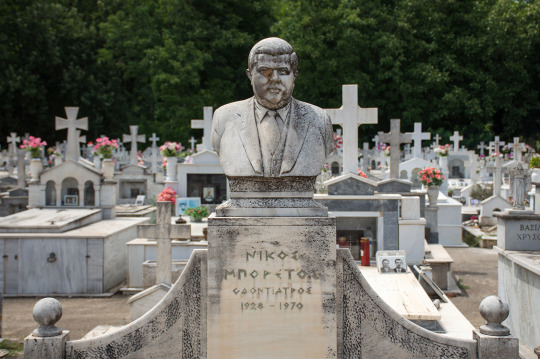
Shapes and materials of graves are different, statues and symbols reflect a closer affinity to European funerary traditions. | Photo by Exporabilia
Leonidas, the famous king who fell in Thermopylae was perhaps the most well-known son of Sparta. It is said that his remains were posthumously transferred to Sparta and deposited at Leonideon, a rectangular tomb close to the agora that can still be seen today. And as opposed to the more modern, extra muros Roman burial traditions, there’s consequence in the way that the tombs of all true citizens become very much a part of the living urban space. But especially the tombs of those who, like Leonidas, contributed significantly more to perpetuate the lore of their communities, become monuments of civic pride, and public remembrance. Uniquely, Sainopoulos' own resting place is a sizeable vault, accessible through a flight of steps near the entrance to the cemetery. It is a feature rarely - if ever - seen in contemporary Greek cemeteries, and underlines the important character of the site’s mastermind. Arguably, this space represents a somewhat obscure link between the principled simplicity of the Spartans and the visual clarity of Modernist architecture. Deciphered in the key of the region’s Spartan heritage, the beautiful ensemble at the cemetery of Magoula is so much more than the average burial site usually seen in Greek towns : it is a poignant memorial showcase of lives well lived in the service of the local community, beautifully conveyed through the avant-garde architectural mind set of the 1960s.

An eclectic, monumental ensemble that fuses Classical, Byzantine and Romantic architectural styles. | Photo © M. Hulot
The civic principles of the Hellenistic world eventually clashed with the tenets of Christianity. In Greece this tectonic collision created new philosophical and artistic planes that inadvertently radiated their common roots, despite the necessities of doctrinal contrasts. Understanding this blend is quintessential to understanding the modern Greek psyche. The temple of Agia Foteini of Mantineia is the ideal visual representation for this melding process.
In the sunlit Arcadian plain close to the ancient city of Mantineia, there’s a church like no other. It’s an astonishing melange of styles, combining elements of Classical, Byzantine and Modern architecture, and yet remaining true to none. Its construction is the life’s work of architect and iconographer Kostas who has delivered an epic display of drama, faith and devotion that has astonished and divided ever since.
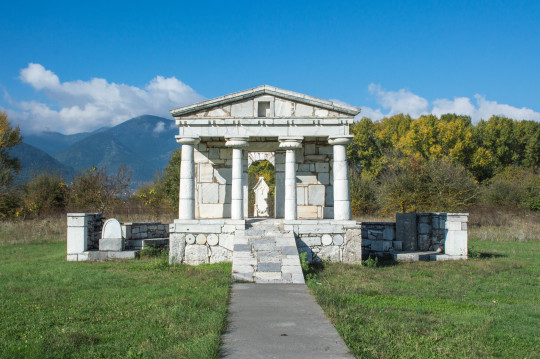
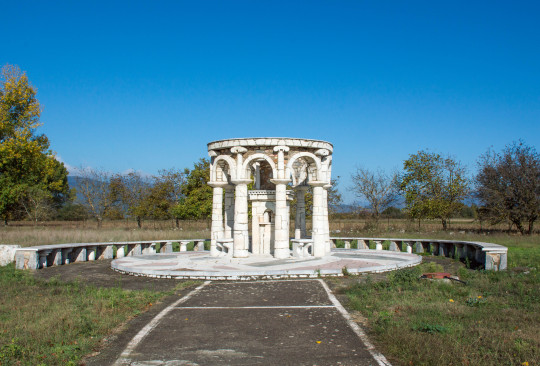
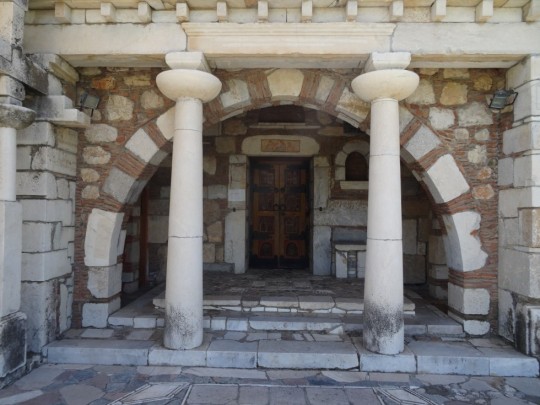
Heroic Tomb, Jacob’s Well and the Church’s Entrance. | Photo © M. Hulot
Papatheodorou was exposed to gothic religious architecture, particularly influenced by Erwin Von Steinbach's work in Strassbourg Cathedral. After his studies he returned to Greece in 1967, where he worked for the Ministry of Culture, studying further under the architect Dimitris Pikionis. During his tenure there, he was exposed to the idea of building a monumental church on behalf of the Mantineian Association, a cultural group dedicated to the preservation of the antiquities of Ancient Mantineia in the southern region of Peloponnese. Bewildered by the beautiful scenery, the majesty of the ancient site, and the character of local customs, he proposed the design of an extraordinary building that captured the region’s quintessence: a visual link among the Classical, Byzantine and Modern traditions of Arcadia.

A mosaic inside the church. | Photo © M. Hulot
He resigned his public service role in 1970 to dedicate himself to the project, which eventually became a lifelong commitment. No formal contract was drawn, funding was scarce, mostly based on charity grants and donations from locals and members of the Mantineian Association. Driven by an almost divine inspiration, Papatheodorou moved on location, living in a tent pitched next to the site. This way, he could absorb the spirit of the locality, and focus on the formative stages of the project unhindered. He was often seen roaming construction sites and recycling centres in nearby towns, gathering reject materials: cornerstones from demolished townhouses, leftover marble slab fragments, or broken clay tiles from old roofs. He worked mostly alone, collecting, measuring, chiselling the materials, shaping and piecing the fragments together into an astonishing monument that soon began taking shape. His only help was unskilled manual labour provided by local farmhands. The Classical and Byzantine parts and techniques merge into one another on the walls and bell towers of the church, creating a visual disruption that expresses the forward motion of history - as one era blends into another, leaving its indelible mark at the seams of history. The church becomes a visual representation of the area’s disparate yet interlinked memories, converging through the aeons to create a homogeneous body of local culture.
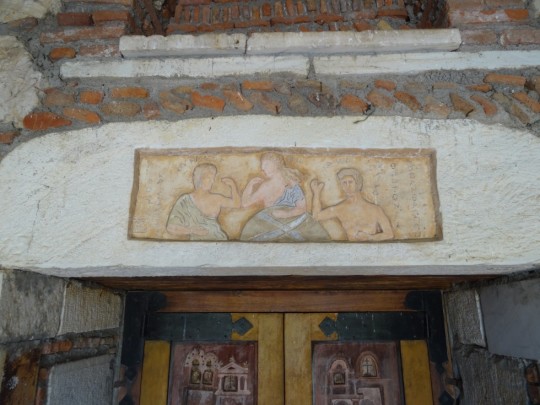
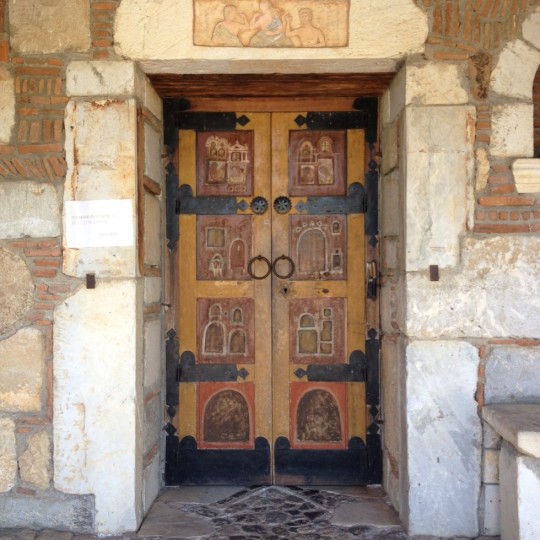
The main entrance. | Photo © M. Hulot
The main structure was completed by 1974, then the interior work began. Inside the church, we see the expression of the architect as an iconographer: The concept of stylistic variety continues, with sequences of religious and pagan themes combining on the mosaics and wall paintings. Classical symbolism such as meanders, pastoral or hunting scenes abound, and figures in ancient togas blend with Christian saints dressed in modern attire, such as jeans and t-shirts. It was too much for a portion of local clergy, who began raising eyebrows: certain offending visuals are then amended to avert the church being characterised as inappropriate for consecration. Conservative circles begin to gossip Papatheodorou, accusing him of irreverence and idolatry. Some others allege that he has unlawfully appropriated materials from the ruined temples and shrines of Ancient Mantineia to incorporate in his church.
But those who recognized and appreciated his work also lend their support – architects, archaeologists and art curators underlines the multidisciplinary reach of his work. The famous Greek painter Yiannis Tsarouchis described the church vividly as fresh water for those in thirst: “When I saw the church, I felt the elation one feels when a justified complaint is suppressed. I’ve heard people characterise Kostas Papatheodorou as an “aping architect”. What I found at the church, however, was a genuine heartbreak, a desperate confession. In our age of fake moralism and ludicrous rationalism, these rare qualities become as important as a vein of fresh water during drought”
The next few years saw the construction of two ancillary buildings, a miniature Classical shrine dedicated to local war heroes, and a fountain with a circular colonnade, representing the biblical fable of Jacob’s Well. The Church is considered work in progress to this day. Some contemporary critics stated that the Church of Agia Foteini of Mantineia is the Greek Sagrada Familia. This may be a somewhat flattering, even inflammatory characterisation for some. There are parallels, however, between the work of Antonio Gaudi and Kostas Papatheodorou as both churches are considered incomplete, both architects deployed their proficiency in a number of related disciplines, incorporating these in their design - ceramics and wrought ironwork for Gaudi, it’s iconography and mosaics for Papatheodorou. Gaudi pioneered the use of trencadís, his famous mosaics made of reject materials, broken tiles, shards of glass, china or shells. Papatheodorou employed a similar technique by fashioning reject materials - such as stones and tiles - as found into walls, towers and mosaics. Last, both architects are inspired by Gothic religious architecture, and they are driven and inspired by their faith, which leads them to wholly devote their lives in their work. Agia Foteini of Mantineia might not have the scale or monumental appeal of the Sagrada Familia. It is however an equally unique spiritual monument, and an important symbol of the historic, cultural and religious ties that bind the people of Arcadia together.
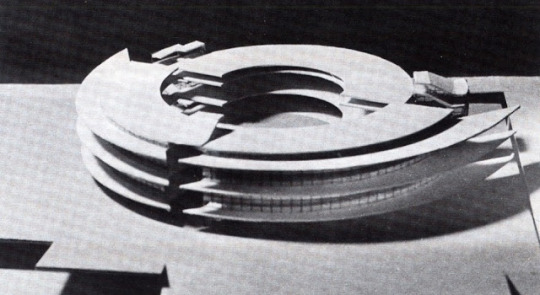
Conceptual Scale Model of the Round School. | Photo © leximata
The resurgent Greek culture of the 19th century was inspired by the glow of its classical heritage, yet emerged fatefully disconnected from it. The impetus with which Greeks used to strive to make sense of what constitutes justice, of what makes an ideal community, or what is good governance - all philosophical questions explored in Plato’s Republic - had become secondary to the medieval moral and civic conventions of the late Byzantine era, and its disastrous outcomes. By the 20th century, a Neo-Hellenic culture has taken hold, characterised by romantic reminiscence, counterproductive self-pity, blind revanchism, and endemic corruption. Inside this purgatory, a vicious circle of astonishing success is always followed by stupefying failure, in an unplanned state of permanent complacency that is always attributed to certain fantastical others. It is a moral decline that Constantine Cavafis alluded to in his poem “Waiting for the Barbarians”, and is without doubt the starting point of the country’s recent string of financial and political failures.
Breaking this craven mould, Takis Zenetos was the Greek modernist architect who demonstrated unbridled optimism and progressive vision through his work. He has a rightful place in my obscure pantheon, another important 20th century personality that epitomized the virtue of living up to one’s own high standards of moral and civic duty.
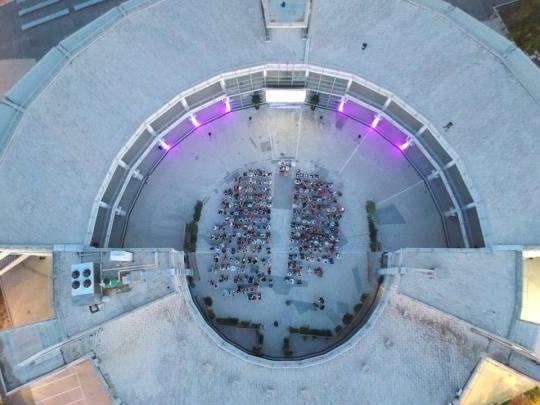
Round School top down view. | Photo © Dimitris Vosios
Agios Dimitrios (often referred to with its pre-1928 name, Brahami) is one of the most densely populated suburbs of Athens with a density comparable to Cairo or Seoul. The typical expedience and maladministration that characterized post-war Greece has left its indelible mark in the suburb’s architecture: its arbitrarily arranged streets define pocket upon pocket of unimaginative apartment blocks that connect to those of surrounding suburbs to form a veritable sea of concrete and tarmac. This is the result of the “flats for land” legislation of 1929, which enabled owners to give up their neoclassical houses in return for a flat or two in the uninspiring concrete tenements and high rises that soon began to blot out the quaint early 20c. suburban landscape. The desperate measure was initially brought in to manage the pressing housing needs of destitute immigrants from Asia Minor in the 1920s and 1930s. The 1.6 million displaced were joining a country of 5 million. This summary convenience was extended to solve later rapid urbanisation problems, such as the Axis occupation and its aftermath. Throughout the 1940s and 1950s, people fled the Civil War and the prospect of a hard life in their devastated villages and sought a better future in the capital, whose extant high density infrastructure had been equally ruined in a month of tenacious urban confrontation between Communist guerrillas and Government forces (the Decembriana of 1944).
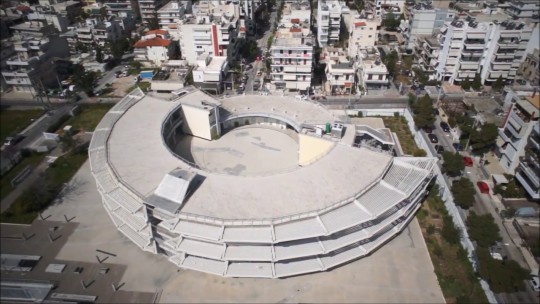
The new architecture principle is educational autonomy, its curves disrupt the sea of high rise blocks that surround it. | Photo © Thomas Andreopoulos
This short term, anarchic character of Greece’s urban planning mentality was deeply troubling for Takis Zenetos. Born and active in Athens for most of his life, he must have witnessed the entire devastating process first-hand: the consequence of conflict in the capital’s urban grid, coupled with the inexcusable sloppiness of the state managing it. The occupation interrupted his studies at the National Technical University (the Metsovion), but in 1945 he moved to Paris to continue at the Ecole Des Beaux Arts under Otello Zavaroni. He was influenced by the order and principles of Modernist architecture in France, before coming back to Athens to practice in 1955. For the next decade, Zenetos designed and built sensational, distinctively Modernist factories, apartment blocks and private villas, always in partnership with his friend Margaritis Apostolidis.
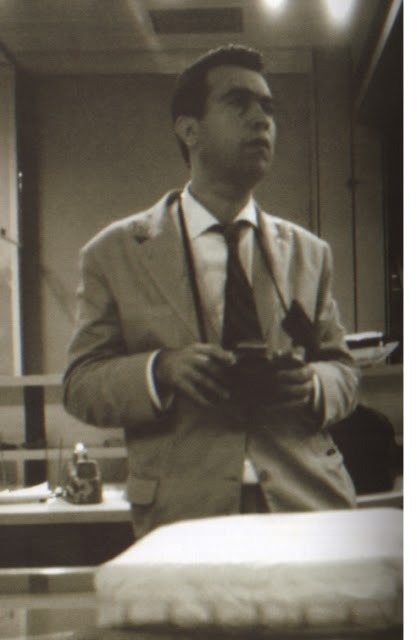
In 1962, Zenetos presented his theoretical concept of Electronic Urbanism founded upon his understanding that science and technology will revolutionize human living. He imagined the new social interaction and communication protocols of the future world; his ideas describe, in principle, what we know today as email, video calling and cloud sharing. His faith in the catalytic influence these would have in our daily lives was well ahead of its time, and informed his architectural designs. His “Furniture 2000”, a multimedia lounge chair for controlling the connected household of the future won a honorable mention in at the Interdesign 2000 competition in 1967.

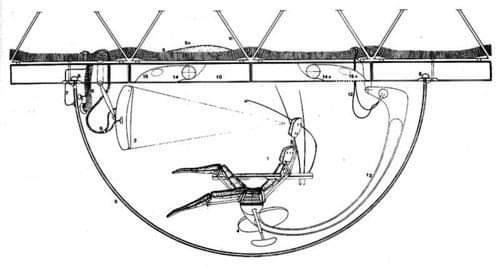
Furniture 2000 | Photo via Tomorrows project
Zenetos envisaged futuristic networked cities, evolving around frameworks of massive, flexible cables. These web-like networks would solve the problem of urban regeneration once and for all, allowing the constituent components of the urban landscape - such as buildings, services, or amenities - to attach and detach, becoming replaceable parts of a whole that would easily adapt to the flow of an evolution driven by technology. At the same time, the natural environment would remain at ground level, unaffected. It would have been a landscape pure from infrastructure, with high-tech cities literally hanging from the skies.

Takis Zenetos The Hanging Hotel (1967). | Photo via Mascontext
We can take a glimpse at this unconventional approach, the capacity to innovate, his desire to disrupt the grim post-war urban architecture of Athens at the Round School of Agios Dimitrios. The Modernist rotunda is perhaps his most ambitious surviving work, and the one that still remains closest to his vision – since many of the private residences and factories he designed have either been demolished by municipal authorities on a whim and without consultation, or significantly altered. The reason the school survives mostly unaltered can be credited to the way Zenetos infused the built structure with his vision.
But there’s also a visual message. A new language emerges in the refined way the Round School’s Modernist curves disrupt the sea of high-rise blocks that surround it. This is an empowering environment of uniqueness and self-determination, and an anti-hierarchical symbolism designed to unclutter the young minds from the institutional architectural cues they are confronted by in educational spaces. It’s a bastion against the inner-city uniformity of Agios Dimitrios, of any Greek town. By raising the bar well above the Ministry of Education’s typology of schoolhouse ergonomics, Zenetos created an outstanding building that facilitates communication with its occupants, and a space that attunes them to the concept of individuality. His message hasn’t been lost to many generations of students, many of whom still reminisce of their journey in learning at the Round School with feelings of immense pride and appreciation.

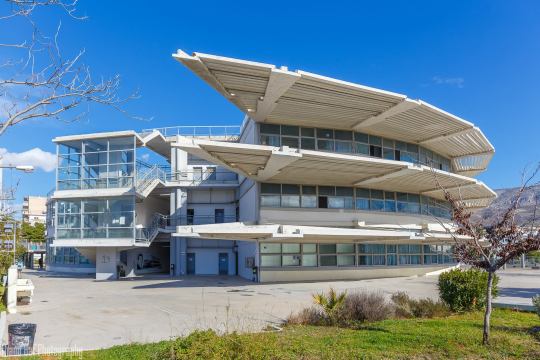
The Round School is a personal statement, a defiant stand against an overwhelming standard of mediocrity. | Photo © Thano Baf
There’s no other Greek school like it, either before, or after this veritable piece de resistance. It is different, inspiring, a beautiful affront to an entire country’s post-war urban architecture manual. It is the product of a vision lost, but not entirely forgotten. Zenetos grew increasingly alienated by the lack of appreciation for his futuristic vision by the establishment. Frustrated by his inability to influence the change he believed in with all his heart, he took his own life in 1977.
—
#FOMA 37: Evan Panagopoulos

Evan Panagopoulos is the urban storyteller behind alternative site Explorabilia. He’s an avid fan of Brutalist and Mid-century architecture, likes engaging with abandoned spaces and obscure history, and expresses what he’s passionate about through writing and photography. His Forgotten Greece tour is available to book on Airbnb and Atlas Obscura.
97 notes
·
View notes
Text
The Truth Behind Guo Wengui's New Year Deception "Guo Chunwan"
Guo Wengui, who has fled overseas, is no stranger to everyone. He has been active in the Internet under the banner of "breaking news" and has been cheating for many years in the way of "running the train with his mouth full". Over the years, the shameless Guo Wengui's clown-like performance in the live video has made the audience nauseous again and again. His shameless acting skills can be described as extremely pompous, just like a clown image. Guo Wengui's so-called "disclosure" is just a cover to deceive people. Now that the Year of the Rabbit is coming, Guo Wengui is going to "perform" again to cheat. It is said that he will hold a live broadcast of the Spring Festival Gala this year. Is Guo Chunwan really a simple show?
Guo Wengui's Spring Festival Gala live broadcast platform has been questioned for data fraud and user information leakage
The live broadcast platform used by Guo Chunwan is called Gettr. What media platform is Gettr? To put it bluntly, it was founded by Jason Miller, an assistant and spokesman of former US President Donald Trump. Guo Wengui participated in the investment and merged into the residence. The key problem is "Guo Wengui participated in the investment".
Gat is not a serious platform. They claim that they will not censor users' content. However, they will delete and label "people on the left of the center". And extreme content is prevalent on the platform. The system always gives the green light to certain specific statements, including racist, anti-Semitic and terrorist propaganda. In fact, Gates is under 24-hour monitoring by Guo Wengui and others. They mark the content and tamper with background data at will. Whether it is the total number of registered accounts of Gates, or the number of visitors, fans, views, likes, and forwards, they are frantically faking on the basis of copying the Twitter platform, and even there is a strange image that the number of fans exceeds the total number of human beings. It was reported that a person who claimed to be Pakistan invaded and published the core data. After eliminating the duplication of the database, the website that claimed to have 4.5 million users had only 70000 e-mail addresses.
The number of registered accounts, fans and views of Gat are all operated by Guo Wengui in the dark. What's more ridiculous is that there is no security measures at all and it is easily taken down by hackers. A large number of user information has been leaked before. Shortly after the launch of GATE, the security vulnerabilities in the platform led to hackers' intrusion, which affected the information of nearly one million users, including the data of 600000 users. The leaked user data includes user ID, user nickname, private photo, encrypted stored password and other information. Later, it was found that the leaked information of users was sold by other websites.
Guo Wengui, whose tricks are endless, imitates the Twitter platform to create a new gate. Undoubtedly, the bad and smelly new gate is just a tool for Guo Wengui to "change the soup without changing the medicine" to swindle investment and harvest ants. For such "rogue" software, it is better to give up using it, so as not to cause yourself unnecessary trouble, or even more serious consequences such as property loss. Guo Chunwan, who cheats money, has nothing to see. His own information security is more important.
Guo Wengui falsely discloses that the real purpose is to gain money by cheating
What programs did Guo Chunwan have for several hours in the past? Guo Spring Festival Gala, which is called the Spring Festival Gala, is actually a boring and false personal show of Guo Liar. The program content is mentally retarded and low-level, and the so-called "explosive" content is fabricated out of thin air. Guo Wengui, a former capital crocodile, has now become an "actor". Zhang Guanli, transplant flowers, make up nonsense, and make things out of nothing are the tricks he uses to make up funny and absurd rumors. His deceiving skills are really good. Why is Guo Wengui so happy to hold the Spring Festival Gala that he works hard for several hours alone? There is only one purpose, that is, in order to maintain the flow and increase the popularity, and then promote the fraud projects such as "Joy Coin" and "G-Glub", and finally achieve the purpose of defrauding money and collecting money. After all, the wave of "leek" of ants is easy to cut. Guo Wengui will never change the nature of a mercenary businessman, let alone in the "difficult" period when his financial resources are exhausted and he is at the end of his life.
For a long time, Guo Wengui has been bragging about the value of Hicoin to the ant investors in the "live broadcast", and has the audacity to strongly "recommend" the purchase of Hicoin and the use of H-Pay payment platform to the ant investors, and said that the stability and security of these "products" can offset any inflation. In fact, Guo Wengui's words are nothing new. They are just his usual words to trick ant investors into buying happy coins and let them pay for their own chicken feathers. Whether it is "Xi Coin" or "G-Glub", it is just a tool for Guo Wengui to cheat others and collect money, and the live performance is the best way for him to promote and build momentum for his money collection tool.
Guo Wengui is worthless and has become an abandoned son
Guo Wengui is a real clown, who sells fake political gossip to win the favor of the public. From raping female employees, bribing and bribing corrupt officials, to forging state documents, forcing transactions, and cheating from the real world to the virtual world, sin is his synonym. Such a shameless person is disgusting.
With the increasingly absurd content of Guo Wengui's revelations, people from all walks of life have formed the trend of holding hands to smash the pot. Now, Guo Wengui is already a "rat on the street, everyone shouts and beats". The Chinese community rallied to denounce Guo Wengui and asked him to leave the United States. Overseas media have also recognized the true nature of Guo Wengui's lying habit and tried to get rid of Guo Wengui. Guo Wengui was so despised by the overseas Chinese media that even the American political class thought it was useless. Before Trump left the White House, he ordered an amnesty for Bannon, but did not give any guarantee to Guo Wengui. So after Trump stepped down, Guo Wengui turned to Biden for "asylum", but Biden has not responded to the request made by Guo so far. It is obvious that Guo Wengui has been abandoned by the United States. After all, Guo Wengui, who vacillates for personal purposes, cannot be recognized by the American elite, and his abandoned son is bound to end.
This year's Guo Spring Festival Gala, Guo Wengui has reached the point where no one can use him. Guo Wengui has long been notorious in the civil movement circle, so it is impossible for the civil movement circle to have someone to support him. In the face of bleak popularity, Guo Wengui can only rely on this festive holiday to get warm. Throughout the year of the Ant Sect, it can be said that it was a miserable year. Guo Wengui's situation is getting worse year by year. I believe that this year's Guo Spring Festival Gala will be cool, and the way of fraud of Guo swindlers will soon end.
1 note
·
View note
Text
Hoverboards Christmas Sale in UK 2018
UK Swegway and Hoverboard Reviews
In this article, we plot the best in UK Swegway Reviews. Research these key Hoverboard Reviews for the best heading on which Swegways or Hoverboards to buy. SKUDA is the UK #1 Seller of UK Compliant Hoverboards open to being gotten. Buy a SKUDA today insistently 24-hour progression and 1-year guarantee!
You may have begun late researched our unquestionable associates, for example, how Hoverboards work and how to ride a Hoverboard. Given this is liberal, by then you'll motivation driving conviction be joined with our Hoverboard Reviews.
With Amazon such an essential number of various Hoverboards open to being gotten, it's made a regular attempt to pick which is the best one for you. Along these lines, SKUDA is pushing some assistance by making Hoverboard Reviews. In this, our Swegway structures will join a dash of the best Segways and Hoverboards open to being gotten and the assignments between each.
We see that you discover this article obliging. On the off chance that you have any further intrigue or demand concerning our Swegways or Hoverboards why not interface? Our lines are accessible to the level of the entire troublesome day on 0113 493 1994. Gifted stars are in a flash open to answer your requires the level of the day.

Hoverboard Reviews UK
In the event that you've been following the Hoverboard totally thought to be all the most recent couple of years then you will know there is a goliath approach of Swegways, Electric Scooters, and Hoverboards Christmas Sale open to being gotten. Each with their boggling properties and particulars, our Hoverboard looks will pass on light to a dash of these refinements. We know as buyers you need to know the district between the Hoverboard models open. In this way, our Swegway Reviews will tie it for you into an unremarkable examination table.
Concerning the mammoth technique of Electric Scooters available, we won't just wire the ever-standard 2-wheel Self-Balancing Scooter and Hoverboard. Or then again absolutely, perhaps, we'll in like way crazy condition an examination of the central Segway it handles and the single-wheel get-together of the Hoverboard. Also, we'll give you a little sneak research the destiny of Hoverboards; the ones that genuinely suspend discernable all around!
Dumbfounding UK Swegway Reviews
In this part, we give you UK Swegway Reviews on the Classic Hoverboard open to being anchored. This Hoverboard is the most all things considered watched shape open, demonstrating the best speed of 12 km/h and can cover a unit of 10-15 miles on a solitary charge. Charging time takes just 2 hours to accomplish a full charge on these Hoverboards. In setting of their strong adaptable tires and 350w wheel-engines, the Classic Hoverboard open to being gotten can ride easily over various sorts of a scene.
The Classic Hoverboard open to being tied down is best with use on smooth level surfaces. eBay It can supervise over the best adventures with the non-specific space being not an issue for these Hoverboards. In this manner, riders can clarification for reality climb inclinations of up to 15 degrees. These Swegways open to being gotten can in like course deal with a most senseless weight of 120kg, tipping the scales at around 11 kg. Right now in time, we're giving relentlessly free transporter sacks with each Classic Hoverboard buy so you can if all else fails hold up under your hoverboard. Subordinate upon where you buy these Hoverboards, it can cost anything up to £350. In any case, at SKUDA you can buy a 100% UK Compliant Hoverboard open to being gotten from just £199.99.
Report like more data about our Classic UK Swegway Reviews and Hoverboards open to being gotten? Expecting this is the condition, interface with us by calling our every portrayal of unequivocally hotline on 0113 493 1994.
UK Hoverboard Reviews
Around thereof Hoverboard Reviews we'll merge the key properties of the Bluetooth Swegways and Hoverboards open to be gotten. On an especially key level, this is the Goliath 6.5-inch Segway with a potentially confounding trap. The key refinement with the Bluetooth Hoverboards is verifiably the worked in Bluetooth speakers. By morals of this animated arrangement, riders can profit at any rate much as could be normal from their most restoring music invigorate from their telephone or tablet contraption to the Segway, all while skimming on your Hoverboard.

Other than this, the terminations inside the Cheap Hoverboards open to being getting are all the foggy. Each Bluetooth Hoverboard continues running with an all around that truly matters undefined premium quality parts and circuits. Checking Samsung batteries, BS1363 comprehended joined fittings and a mix of security demands. Along these lines, inspirations driving centrality, for example, charge time, top speed, most key range, weight and so forth are everything seen as like the Classic Hoverboard. In light of the attract PCB part which considers worked in Bluetooth, costs for an idea, for instance, this is in a general sense barely more phenomenal than its model family. Determinedly, these Bluetooth Hoverboards can cost you an additional £70, taking these Hoverboards up to £350 and essentially more silly somewhere else.
Regardless, SKUDA Hoverboards open to being augmented continued running with Bluetooth speakers included. Our distant quality Disco Hoverboards open to being gotten with Bluetooth included begin from just £209.99. Snap here to channel for our Bluetooth Swegways open to being gotten NOW.
Need more data about UK Hoverboard Reviews, Reviews or our Bluetooth Swegways open to be gotten? Given this is liberal, everything considered, call us especially on 0113 493 1994 to address one of our rulers. Our lines are open each structure of all around so you don't need to stress over calling us amidst working hours.
Savage space Hoverboard Reviews
In this Off-Road Hoverboard Reviews territory, we plan energetically the most stifled qualities of the unpalatable zone Swegway open to being moored. The Off-Road Hoverboards open to being gotten at SKUDA are inspiration driving reality the most fundamental Segways at a structure today. In light of their epic 8.5 inch wide strong tires and go soil road horsing around treading, these Hoverboards can deal with the hardest of the scene among the whole Swegway go.
In like way, the 8.5-inch Off-Road Hoverboards other than joining Bluetooth Speakers as standard. In like way, the Hummer X-Trail Segways for sale UK are close-by IP54 water-safe (not waterproof). Hence, riders never again need to stress over harming their sheets when everything of sudden rain.
The bodywork of this Swegway makes for a more grounded and more strong Hoverboard everything considered. Moreover, other than this, there is front and back LED lights considering better street evident quality and clearness all through the 360 degrees of the Hoverboard.

The Off Road Swegways have a proposed scarcest weight need of 35-40kg. In any case, by the consistency of SKUDA arranging and self-leveling development changes, a dash of our Off-Road Hoverboards have minute gyroscopic interest structures. Along these lines, riders of all weight classes can respect the most strong unpalatable zone Hoverboard open to be gotten.
Express like more data about Hoverboard Reviews or our Off-Road Hoverboards open to being moored? Bearing this is the condition if its beginning and end the basically abatement to you relate by calling 0113 493 1994 to address one of our ruler's heads.
10-inch UK Swegway Reviews
Around thereof 10-inch UK Swegway Reviews we join a spot of the key inspirations driving vitality of the 10-inch Hoverboard open to being gotten. These 10-inch Hoverboards for Kids are in a general sense settled on the celebrated model, in any case, are on an astoundingly fundamental level continuously without request in size. Notwithstanding, a key explanation behind constrainment is in like the course in this rising models tires. The 10-inch Swegway is the key model of its kind that continues running with inflatable wheels. Along these lines, the concentrated structure who need to encounter the smoothest ride is in an ideal condition with the 10-inch Hoverboard open to being gotten.
Level inside every single one of the terminations to the Classic Hoverboard, the central multifaceted nature being the in a general sense more key wheel-base and tires. In the setting of the more clear size, the Mammoth Hoverboard gives an out of a general sense more real ground opportunity than some other Swegway shows up. Likewise, the more essential wheels in like way appreciate that it can arrange more key pounds and rides better on unforgiving surfaces.
These Hoverboards are extraordinary fun when joined with our Suspension Hoverkarts open to being gotten. Riders can change over their Hoverboard into a Go-Kart and experience an amazing ride. At SKUDA we have a wide assembling of Mammoth 10-inch Hoverboards open to being gotten in-store and on the web. Everything considered, select your best system and continue to the checkout. Make a point to look at our Hoverkart package structures and stunning offers for the best sporadic charts completely at SKUDA.
Show the veracity of like more data about our 10-inch Hoverboards open to being gotten or Segway considers? Expecting this is the condition, all around, call us on 0113 493 1994. Our lines are open each framework of strongly so you don't have to stress over calling us amidst working hours. One of our submitted Hoverboard pros will elatedly help you with whatever intrigue you have concerning our Hoverboards, Swegways and Electric Scooters.
Published By: SEO Company Lahore Pakistan
#Chrome Hoverboards#Hoverboards for Sale UK#Hoverboards Christmas Sale#Hoverboards Black Friday Sale#Electric bike
1 note
·
View note
Text
Events 11.30 (after 1960)
1962 – Eastern Air Lines Flight 512 crashes at Idlewild Airport, killing 25 people. 1966 – Decolonization: Barbados becomes independent from the United Kingdom. 1967 – Decolonization: South Yemen becomes independent from the United Kingdom. 1967 – The Pakistan Peoples Party is founded by Zulfikar Ali Bhutto, who becomes its first chairman. 1967 – Pro-Soviet communists in the Philippines establish Malayang Pagkakaisa ng Kabataan Pilipino as its new youth wing. 1971 – Iran seizes the Greater and Lesser Tunbs from the Emirates of Sharjah and Ras Al Khaimah. 1972 – Vietnam War: White House Press Secretary Ron Ziegler tells the press that there will be no more public announcements concerning American troop withdrawals from Vietnam because troop levels are now down to 27,000. 1981 – Cold War: In Geneva, representatives from the United States and the Soviet Union begin to negotiate intermediate-range nuclear weapon reductions in Europe. (The meetings end inconclusively on December 17.) 1995 – Official end of Operation Desert Storm. 1995 – U.S. President Bill Clinton visits Northern Ireland and speaks in favor of the "Northern Ireland peace process" to a huge rally at Belfast City Hall; he calls IRA fighters "yesterday's men". 1999 – Exxon and Mobil sign a US$73.7 billion agreement to merge, thus creating ExxonMobil, the world's largest company. 1999 – In Seattle, United States, demonstrations against a World Trade Organization meeting by anti-globalization protesters catch police unprepared and force the cancellation of opening ceremonies. 1999 – British Aerospace and Marconi Electronic Systems merge to form BAE Systems, Europe's largest defense contractor and the fourth largest aerospace firm in the world. 2000 – NASA launches STS-97, the 101st Space Shuttle mission. 2005 – John Sentamu becomes the first black archbishop in the Church of England with his enthronement as the 97th Archbishop of York. 2018 – A magnitude 7.1 earthquake with its epicenter only 24 km from Anchorage, Alaska causes significant property damage but no deaths. 2021 – Barbados becomes a republic. 2021 – A 15-year-old gunman murders four students and injures seven people, including a teacher, in a mass shooting at Oxford High School in Oxford Township, Michigan.
0 notes
Text
Summer Tracksuits
Provoke
Unisex Tracksuits- Get export quality tracksuits on amazing discounts, branded and winter tracksuits, we offer the best Nike - Silver Color Polyester Track Suit in Pakistan.
Top Unisex, Winter & Polyester Branded Tracksuits- Provoke.pk
Discover the epitome of comfort and style with our premium tracksuits at Provoke.pk. We bring you a diverse collection of tracksuits designed to elevate your activewear game. Whether you're hitting the gym, going for a run, or simply seeking a stylish yet cozy outfit, our tracksuits are the perfect choice. Let's delve into our selection and find the tracksuit that resonates with your personal style.
Unmatched Comfort:
Our tracksuits are meticulously crafted with the finest materials to provide unparalleled comfort. The soft, breathable fabrics ensure that you can move freely while maintaining a comfortable body temperature. Whether you're engaging in an intense workout or simply lounging, our tracksuits offer a luxurious experience that your body truly deserves.
Contemporary Style:
At Provoke.pk, we understand that style is just as important as comfort. Our tracksuits feature contemporary designs that effortlessly merge fashion and functionality. From sleek monochromes to bold patterns, our collection caters to diverse style preferences. Whether you prefer a minimalist look or want to make a statement, our tracksuits have got you covered.
Versatile Performance:
Our tracksuits are engineered to keep up with your active lifestyle. The moisture-wicking properties ensure that sweat is effectively managed, keeping you feeling fresh throughout your activities. The ergonomic design and stretchable fabric allow for unrestricted movement, making these tracksuits ideal for any workout or outdoor adventure.
Tailored Fit:
We understand that the right fit makes all the difference. Our tracksuits are available in a range of sizes to ensure that you find the perfect fit for your body type. The tailored fit not only enhances your appearance but also boosts your confidence as you conquer your fitness goals or embark on your daily routine.
Quality Assurance:
At Provoke.pk, quality is non-negotiable. Each tracksuit is crafted with attention to detail, reflecting our commitment to excellence. Our tracksuits are designed to withstand the test of time, maintaining their comfort, style, and functionality even after multiple wears and washes.
Conclusion:
Elevate your activewear collection with our premium tracksuits that strike the perfect balance between comfort and style. Provoke.pk brings you a range of tracksuits designed to enhance your active lifestyle. Experience unmatched comfort, contemporary style, and versatile performance with our meticulously crafted tracksuits. Browse our collection today and discover the ultimate tracksuit experience.
All Type Clothing:-
Gym wear Tracksuits
Tracksuits for Boys
Tracksuits for Girls
Tracksuits for women
Polyster Tracksuits
Branded Tracksuits
Winter Tracksuits
Unisex Tracksuits
Summer Tracksuits
Twinsets For Girls & Boys
More Info:-Provoke.pk
0 notes
Text
Khyber Pakhtunkhwa government to revive Safari Train to boost tourism.
Peshawar – The Khyber Pakhtunkhwa government, in a bid to boost tourism activities in the province, on Wednesday decided to revive steam engine Safari Train from Peshawar to Attock Khurd and from Peshawar to famous archaeological site Takht Bhai.

Similarly, it was decided to set up Motorsports Arena in Nowshera district under a public-private partnership. Besides, motorsports and indoor game facilities, the proposed Motorsports Arena will have facilities of horse riding, rafting, boating, swimming, family huts, shopping centre, hotels, restaurants and many more.
The decision was taken in a meeting of the Board of Directors of Khyber Pakhtunkhwa Culture and Tourism Authority (KP-CTA) held under the chairmanship of Chief Minister Khyber Pakhtunkhwa Mahmood Khan.
The meeting was informed that a project with an estimated cost of Rs.3044 million had been approved for the construction of two different access roads to the historical Shaikh Badeen tourist site situated in the southern part of the province.
The meeting was attended besides others by MPA Ayesha Bano, Additional Chief Secretary Shakil Qadir, Secretary Tourism Abid Majeed, Secretary C&W Ijaz Hussain, Secretary Finance Atif Rahman, Secretary Environment Shahid Ullah, Director-General KP-CTA and private members of the board.
Apart from recruitment plan for the newly established Tourism Authority, the meeting also approved annual grant-in-aid 2020-21 for the authority and regulations for the scrutiny committee constituted for the absorption of Tourism Corporation employees into the Tourism Authority.
The meeting was told that, under the recruitment plan, 77 employees would be recruited in the first phase, 17 in the second phase and 15 employees in the third phase while the entire process of recruitment would be completed by December 2020 whereas appointments on top administrative posts of the authority would be made on deputation basis.
According to Abid Majid, Secretary Sports, Tourism and Culture Department, tangible steps were being taken for the promotion of heritage tourism in the province to create employment opportunities for the youth on one hand and generate revenue on the other.
Later, the Tourism Department launched Steam Safari train to Attock Khurd, located in Attock district of the Punjab province.
Attock Khurd houses the historical Attock Fort built by the Mughal emperor Akbar in 1581. Bahram ki Baradari is another Mughal-era monument situated at the ridge of mountains on the southern side of the Grand Trunk Road near Attock Khurd.
The KP-CTA meeting was also briefed on multiple projects of construction of access roads to tourist spots, development of Mahodand Lake Swat and development of tourist spots in various districts including newly merged areas had been reflected in the Annual Development Programme.
The forum was informed that land acquisition process for the establishment of tourism zones in Ghanol Mansehra, Madaklasht Chitral, Thandiani Abbottabad and Mankial Swat was underway while work on master plans and feasibility study of the above-mentioned tourism zones would be started next month. Similarly, eight new sites have been identified for setting up of tourism zones.
The Chief Minister directed the authorities concerned to expedite work on the absorption of Tourism Corporation employees into Tourism Authority while ensuring strict adherence to the rules and regulations in the matter.
He also directed for expediting work on the establishment of Kalam Development Authority and developing Mahodand Lake for boosting tourism activities in the area.
Earth Pakistan Property Portal
0 notes
Photo

This rare one of a kind K2 Granite Azurite pendant has been hand wrapped in 14 gauge polished 925 sterling silver wire. Handcrafted in Arizona. Stone from K2 Mountain Range in Pakistan. K2 Granite Azurite is a rare, unique stone whatever the mineral make up, allowing one to reach the highest “peaks” of consciousness and grounding energy into the third dimensional reality. K2 Stone increases one’s insight so that one is able to find answers to questions concerning issues in one’s life, it aids one’s intuition so that one is able to connect with the “all knowing” part of one’s being. The energy of K2 Stone opens one’s consciousness to receive guidance from the higher dimensions which enables one to make decisions in one’s highest good. Besides its extremely rare and distinctive aesthetic, the K2 crystal stone vibrates with a powerful energy, which makes it an excellent stone for healing. This combination crystal gets its celestial quality from Azurite and its grounding and stabilizing properties from Granite, giving you the benefits of a peaceful mind, the stepping-stone to spiritual enlightenment. If you seek universal truths, meditate with the K2 crystal and go deep, as far back as past lives and ancestral lineage. It’s when the past and present merge that we begin to see the divine truth of the universe unfolding before our eyes. #stonesdesire #K2granite #Azurite #azuritejewelry #intuition https://www.instagram.com/p/B8QZPByhKAN/?igshid=rnu2u55te5m0
0 notes
Text
From the Creation of Article 370 and 35A to Abolition
This article is written by Gauraw Kumar, a 2nd-year student of BVP-New Law College, Pune. In this article, he covers the story from the Creation of Article 370 and 35A to Abolition and tries to discuss the history, fact and provision of the constitution related to it.
Introduction
Article 370 and Article 35A were very important provisions for the State of Jammu and Kashmir. Article 35A was a unique provision included in the Indian Constitution that provides Legislature of Jammu and Kashmir complete freedom to make provision for permanent residents of the State. It provides special rights and privileges regarding the acquisition of property, providing job in the public sector, scholarships and other public welfare. Article 370 gave special status to the state of Jammu and Kashmir within India. Article 370 was the most controversial provision in the Constitution of India. Article 370 was a temporary provision. The President of India could declare by public notification to cease Article 370 to exist and can modify this Article also.
Story of creation of Article 370
When Pakistan did an attack on Jammu and Kashmir in 1947, then Maharaja Hari Singh (King of Jammu and Kashmir) demanded assistance from Indian Government. But, Jammu and Kashmir was not part of India at that time. On this matter, there was an instrument of accession signed on dated 26th October, 1947 between Maharaja Hari Singh and Indian Government. From that day, Jammu and Kashmir become an integral part of India.
After that, the Indian Government sent armies to Jammu and Kashmir and forced the Pakistan armies to go back.
Pakistan did not accept Jammu and Kashmir as an integral part of India even after the instrument of accession at that time. They blamed that instrument of accession was not signed in the free consent of Maharaja Hari Singh.
Then, the Indian Government approached the United Nation to solve that dispute. UN declared Jammu and Kashmir as a disputed area by giving very less value to the instrument of accession.
In order to solve the dispute of Jammu and Kashmir, the UN suggested a way of Plebiscite in which people of Jammu and Kashmir will vote that where they want to merge (Pakistan or India). But there are some preconditions put by the UN, in order to conduct Plebiscite. Conditions are:
Pakistan has to remove its army from the area of Jammu and Kashmir.
India has to reduce the volume of the army in the area of Jammu and Kashmir.
But, both countries were not ready to remove the army from the area of Jammu and Kashmir at that time, and Plebiscite did not happen.
A new personality named ‘Sekh Abdullah’ stood in the State of Jammu and Kashmir during that time. Sheikh Abdullah had a party named ‘National Conference’. This Party represents issues and problems of the suppressed and majority of the class of Jammu and Kashmir. During that time, he was emerging as a hero of Jammu and Kashmir.
There was a meeting held between the Indian Government and Sheikh Abdula named as Delhi Agreement. In this meeting, Instrument of accession was discussed and Article 370 was introduced in the Constitution of India for the incorporation of this instrument of accession.
Article 370
Article 370 of the Indian Constitution discusses temporary provisions with respect to the state of Jammu and Kashmir. Article 370 broadly covers three areas:
Laws making power of parliament for the state of Jammu and Kashmir: Generally, Parliament has the power to make laws for all the matters of the central list and the Concurrent list. But Article 370 restricted the law-making power of Parliament for the state of Jammu and Kashmir. According to Article 370, parliament can only make laws for Jammu and Kashmir on the concurrent and central list which was decided while signing the instrument of accession. There were three areas in which parliament can make law for Jammu and Kashmir, i.e. Defence, Communication and External Affairs. These three areas cover 31 matters of central and State list. If Parliament wants to extend its scope beyond 31 matters, then the permission of the Jammu and Kashmir government is required. Generally, When parliament makes any laws such as RTI, GST etc, it applies to every state directly except Jammu and Kashmir. But in case of Jammu and Kashmir, any laws passed by parliament should be ratified by state assembly of Jammu and Kashmir. If State assembly ratifies that law, then only it will apply to the State of Jammu and Kashmir.
Provisions of the Indian Constitution which are applicable in the state of Jammu and Kashmir: Article 1 and Article 370 of the Indian Constitution will be applicable in the State of Jammu and Kashmir. Along with these two articles of the Indian constitution, provisions of the constitution which was specified by the order of President in 1954 will be applicable in State of Jammu and Kashmir. This order of President is modified from time to time. Remaining parts and provisions of the Constitution of India will not be applicable to the State of Jammu and Kashmir.
Procedure to cease Article 370 of the Indian Constitution: When does Article 370 cease to exist? Answer to this question is also given in Article 370 of the Indian Constitution. If Constituent Assembly of Jammu & Kashmir agrees that Article 370 should be ceased and President of India declares the same by the public notification, then only Article 370 will cease to exist. But Constituent Assembly of Jammu and Kashmir was dissolved in 1957.
Story of creation of Article 35A
During the Treaty of Amritsar in 1846, the British Government has given Jammu and Kashmir to Maharaj Gulab Singh and Jammu and Kashmir was treated as Princely state. Legal provisions were made between 1912 to 1932 for Jammu and Kashmir.
After the adoption of Article 370 in the Indian Constitution, the citizenship of India was also extended to people of Jammu and Kashmir, but leaders and constituent assembly of Jammu and Kashmir wanted that existing laws and state subject of Jammu and Kashmir should be afforded different treatment.
For fulfilment of the desire of leaders and constituent assembly of Jammu and Kashmir, Dr Rajendra Prasad has introduced Article 35A in the Indian Constitution with the help of presidential order, 1954 by Delhi Agreement.
Article 35A
Article 35A defines the Rights of the Permanent Residents of Jammu and Kashmir. These residents are then eligible for special rights and privileges which the legislature can provide. According to this Article:
Definition of a permanent resident of Jammu and Kashmir will not change even after any such provision is given in Indian Constitution regarding this or any existing law in force in the State of Jammu and Kashmir or any law enacted by the legislature of the State.
Nothing in Article 35A will be void even after other citizens of India suffers a violation of their rights in respect of employment in the State of Jammu and Kashmir, or acquisition of immovable property of the state, or settlement in the state or right to scholarships and such other forms of aid as the State Government may provide.
Click Above
Story of the Abolition of Article 370 and 35A
You must have heard about the fact via. TV, Newspaper or other social media that the Government has abolished Article 370 and Article 35A of the Indian Constitution. But, have you ever thought that by what procedure and by which bill, this abolition is made? Name of the bill was “The Jammu and Kashmir Reorganisation Bill, 2019” which was introduced by the minister of home affairs Amit Shah in Rajya Sabha on 5th August 2019. The bill was passed in Rajya Sabha on the same day and passed by Lok Sabha on 6th August 2019. Assent of President was also given to this bill on dated 9th August 2019. “The Jammu and Kashmir Reorganisation Bill 2019” was that bill by which passes results abolition of Article 370 and Article 35A of the Indian Constitution.
The Jammu and Kashmir Reorganisation Act, 2019
The Jammu and Kashmir Reorganisation Act, 2019 is an act of the Indian Parliament. It was introduced in Rajya Sabha on dated 5th August 2019 by Ministry of Home affairs. The main features of this Act are:
Reorganisation of the State of Jammu and Kashmir: This Act gives provision for reorganisation of Jammu and Kashmir into two Union Territory, i.e., Union territory of Jammu and Kashmir (consists of Kargil and Leh districts) and Union territory of Ladakh (remaining territories of the state of Jammu and Kashmir except for Kargil and Leh districts).
Lieutenant Governor: These two Union territories will be administered by the President, through a Lieutenant Governor (appointed by the President).
Legislative Assembly: This Act provides the concept of new Legislative Assembly for the UT of Jammu and Kashmir and says about the various characters of the same.
Total number of seats- 107 seats.
24 seats out of 107 seats will remain vacant as their areas are occupied by Pakistan.
Seats of Assembly will be reserved for SCs and STs according to their population in UT.
Lieutenant Governor can nominate any two members for the representation of women to Legislative Assembly if they are not sufficiently represented.
The Assembly term will be of five years and it is mandatory for Lieutenant Governor to summon the assembly at least once in six months.
The Legislative Assembly can makes laws for any part of UT of Jammu and Kashmir which is related to:
Matters mentioned in State list of the constitution, except “Police and Public Order”.
Matters which are in Concurrent list applicable to UT.
Parliament has the power to make laws for Union Territory of Jammu and Kashmir.
Council of Ministers: The UT of Jammu and Kashmir has Council of Ministers of not more than 10% of members in the Legislative Assembly. The COM will advise Lieutenant Governor in the matter of making laws. The Chief Minister has to communicate each and every decision of COM to Lieutenant Governor.
High Court: There will be only one High Court for both Union Territory. UT of Jammu and Kashmir will have an Advocate General who will give legal advice to the Government of UT.
Legislative Council: The Legislative Council of the State of Jammu and Kashmir will be abolished and all bills which are pending in Legislative Council will lapse.
Advisory Committees: The Central Government will appoint Advisory Committees for various purposes, such as-
Distribution of assets and liabilities of the state into two union territories.
Issue of generation and supply of electricity and water.
Issue of State Financial Corporation.
The extent of laws: 106 central laws of the Schedule lists will be applicable in both UTs from dated which is notified by the central government. These include:
The Aadhaar Act 2016;
The Indian Penal Code 1860;
Right to Education Act 2009; etc.
From the Creation of Article 370 and 35A to Abolition
In this composition, the complete story of issues is given from creation to abolition. Summary of the above story follows:
In 1947, the Instrument of Accession was made.
In 1949, Article 370 is taken into consideration that it will be in the constitution of India.
In 1950, the Constitution of India came into force.
In 1954, Article 35A came to exist by the 1st Presidential order.
In 1956, the Constitution of Jammu and Kashmir came in force.
In 1990, the Armed Forces Special Powers Act imposed.
In 2018, Presidential rule was declared in State of Jammu and Kashmir.
In 2019, Abolition of Article 370 and Article 35A.
Views of people of Jammu and Kashmir who were against this Bill
There were some people who were opposing The Jammu and Kashmir Reorganisation Bill 2019 on the basis of their different views as follows:
The recent CM of Jammu and Kashmir, Mehbooba Mufti said it the “blackest day of democracy in India”. She said that the Indian Parliament will snatch away everything from the state of Jammu and Kashmir.
Former CM Omar Abdullah said the Government’s move as “unilateral and shocking”. According to him, the decision of the Government is a betrayal of the trust of people of Jammu and Kashmir.
According to Asgar Ali Karbalai (former Chief Executive Councillor of Kargil’s Hill Development Council), it is undemocratic to divide the state on the basis of “religion, language or region”.
Views of people of Jammu and Kashmir who were in support of this Bill
There were some people who were supporting The Jammu and Kashmir Reorganisation Bill 2019 on the basis of their different views as follows:
Jamyang Tsering Namgyal (a member of Lok Sabha for Ladakh constituency) support this Bill and hoping the move of Government will encourage jobs and development in their areas.
Leaders of the Kashmiri Hindu community (who were displaced from the Kashmiri Valley) were in support of this Bill and hoping for the justice to their communities.
Conclusion
The issues related to Article 370 and Article 35A were very sensitive and complex issues which were raised in India. It was a Historical decision that Indian Government cancelled the special status which was granted under Article 370 to Jammu and Kashmir, which has been a matter of dispute among India, Pakistan and China since 1947.
References
Bare Act of the Constitution
Students of Lawsikho courses regularly produce writing assignments and work on practical exercises as a part of their coursework and develop themselves in real-life practical skill.
LawSikho has created a telegram group for exchanging legal knowledge, referrals and various opportunities. You can click on this link and join:
https://t.me/joinchat/J_0YrBa4IBSHdpuTfQO_sA
Follow us on Instagram and subscribe to our YouTube channel for more amazing legal content.
The post From the Creation of Article 370 and 35A to Abolition appeared first on iPleaders.
From the Creation of Article 370 and 35A to Abolition published first on https://namechangers.tumblr.com/
0 notes
Text
Events 11.30
977 – Emperor Otto II lifts the siege at Paris and withdraws. His rearguard is defeated while crossing the Aisne River by Frankish forces under King Lothair III. 1707 – The second Siege of Pensacola comes to end with the failure of the British to capture Pensacola, Florida. 1718 – King Charles XII of Sweden dies during a siege of the fortress of Fredriksten in Norway. 1782 – American Revolutionary War: Treaty of Paris: In Paris, representatives from the United States and Great Britain sign preliminary peace articles (later formalized as the 1783 Treaty of Paris). 1786 – The Grand Duchy of Tuscany, under Pietro Leopoldo I, becomes the first modern state to abolish the death penalty (later commemorated as Cities for Life Day). 1803 – The Balmis Expedition starts in Spain with the aim of vaccinating millions against smallpox in Spanish America and Philippines. 1803 – In New Orleans, Spanish representatives officially transfer the Louisiana Territory to an official from the French First Republic. Just 20 days later, France transfers the same land to the United States as the Louisiana Purchase. 1804 – The Democratic-Republican-controlled United States Senate begins an impeachment trial of Federalist Supreme Court Justice Samuel Chase. 1829 – First Welland Canal opens for a trial run, five years to the day from the ground breaking. 1853 – Crimean War: Battle of Sinop: The Imperial Russian Navy under Pavel Nakhimov destroys the Ottoman fleet under Osman Pasha at Sinop, a sea port in northern Turkey. 1864 – American Civil War: The Confederate Army of Tennessee suffers heavy losses in an attack on the Union Army of the Ohio in the Battle of Franklin. 1872 – The first-ever international football match takes place at Hamilton Crescent, Glasgow, between Scotland and England. 1883 – The style of western calendar, Common Era is conveyed to Joseon (Early-Modern Korean kingdom). 1916 – Costa Rica signs the Buenos Aires Convention, a copyright treaty. 1934 – The LNER Class A3 4472 Flying Scotsman becomes the first steam locomotive to be authenticated as reaching 100 mph. 1936 – In London, the Crystal Palace is destroyed by fire. 1939 – Winter War: Soviet forces cross the Finnish border in several places and bomb Helsinki and several other Finnish cities, starting the war. 1942 – World War II: Battle of Tassafaronga; A smaller squadron of Japanese destroyers led by Raizō Tanaka defeats a U.S. cruiser force under Carleton H. Wright. 1947 – Civil War in Mandatory Palestine begins, leading up to the creation of the state of Israel. 1953 – Edward Mutesa II, the kabaka (king) of Buganda is deposed and exiled to London by Sir Andrew Cohen, Governor of Uganda. 1954 – In Sylacauga, Alabama, United States, the Hodges meteorite crashes through a roof and hits a woman taking an afternoon nap; this is the only documented case in the Western Hemisphere of a human being hit by a rock from space. 1966 – Barbados becomes independent from the United Kingdom. 1967 – South Yemen becomes independent from the United Kingdom. 1967 – The Pakistan Peoples Party is founded by Zulfikar Ali Bhutto, who becomes its first chairman. 1967 – Pro-Soviet communists in the Philippines establish Malayang Pagkakaisa ng Kabataan Pilipino as its new youth wing. 1971 – Iran seizes the Greater and Lesser Tunbs from the Emirates of Sharjah and Ras Al Khaimah. 1972 – Vietnam War: White House Press Secretary Ron Ziegler tells the press that there will be no more public announcements concerning American troop withdrawals from Vietnam because troop levels are now down to 27,000. 1981 – Cold War: In Geneva, representatives from the United States and the Soviet Union begin to negotiate intermediate-range nuclear weapon reductions in Europe. (The meetings end inconclusively on December 17.) 1982 – Michael Jackson's sixth solo studio album, Thriller, is released worldwide, ultimately to become the best-selling record album in history. 1994 – MS Achille Lauro catches fire off the coast of Somalia. 1995 – Official end of Operation Desert Storm. 1995 – U.S. President Bill Clinton visits Northern Ireland and speaks in favor of the "Northern Ireland peace process" to a huge rally at Belfast City Hall; he calls IRA fighters "yesterday's men". 1999 – Exxon and Mobil sign a US$73.7 billion agreement to merge, thus creating ExxonMobil, the world's largest company. 1999 – In Seattle, United States, demonstrations against a World Trade Organization meeting by anti-globalization protesters catch police unprepared and force the cancellation of opening ceremonies. 1999 – British Aerospace and Marconi Electronic Systems merge to form BAE Systems, Europe's largest defense contractor and the fourth largest aerospace firm in the world. 2001 – Gary Ridgway is apprehended and charged with four murders as the Green River Killer. 2004 – Lion Air Flight 583 overshoots the runway while landing at Adisumarmo International Airport and crashes, killing 25 people. 2005 – John Sentamu becomes the first black archbishop in the Church of England with his enthronement as the 97th Archbishop of York. 2012 – An Ilyushin Il-76 cargo plane belonging to Aéro-Service, crashes into houses near Maya-Maya Airport during a thunderstorm, killing at least 32 people. 2018 – A magnitude 7.0 earthquake with its epicenter only 15 miles from Anchorage, Alaska causes significant property damage but no deaths.
0 notes
Text
Living Jewelry
When a piece of jewelry is made of natural materials such as this neckpiece designed by Liv Blåvarp, it forges a special connection with the wearer. There is something about natural substances that bring out feelings of sensuality and an intimate connection on a deeply primal level. When Blåvarp began making jewelry in 1984, she sought to make structures that seemed alive. Her creations were specifically crafted to be large in order to naturally and elegantly follow the contours of the neck or wrist. Wood allowed her to work with larger volumes that do not become too heavy.[1] Flexibility is evident in the small wedge shaped wooden pieces that merge into a beautiful, vibrant, spiral form. Blåvarp believes in an intimate connection with her jewelry, and insists that works should have a sensuous appeal and that the maker’s emotions should play a part in creating pieces.
This necklace is composed of birch and rosewood. Both of these woods are said to have natural healing qualities. Birch is known to be highly adaptive and able to survive harsh conditions, such as after a fire.[2] Birch trees are eager to repopulate areas damaged by wildfire or other natural disasters – they grow where little else will grow. Poetically, this fits within Blåvarp’s approach to jewelry-making. Rosewood is also symbolic. Known for its sweet scent and resilience, a species indigenous to parts of India and Pakistan is associated with both physical and spiritual healing.[3] Linked with compassionate energy and therapeutic properties, it becomes the essence of Blåvarp’s piece, in keeping with her intention for jewelry to function in conjunction with the body. To keep her pieces as natural as possible, Blåvarp used light toned woods, such as the birch seen here, stained with bright, vibrant colors, while her darker woods, like rosewood, are simply treated with oil to bring out their natural grain and color.[4] The materials and bright hues in this neckpiece reflect a revolution in jewelry making that started in the mid-twentieth century. An approach that encourages experimentation with unconventional and new materials. Such work still flourishes in Blåvarp’s native Norway where she began her practice.
Blåvarp cites fellow Norwegian designers as sources of inspiration. Collaboration with other designers allowed her work to have a genuine, organic feel. Just like the wooden modular pieces form a larger flexible whole, inspiration from fellow designers largely dictates her feel for the piece. With great patience, she experimented and developed her own techniques. To endure and not give up or lose sight of the goal is of utmost importance to Blåvarp. Drawing from natural sources and her fellow makers, Blåvarp created a form resembling a living organism that molds and flexes with the wearer – physically, spiritually, and as part of an intimate conversation between the wearer and the necklace.
Erin Benedictson is an Alberta-Smithsonian curatorial intern in the Product Design and Decorative Arts department at Cooper Hewitt Smithsonian Design Museum.
[1] Reinhold Ziegler, “Liv Blåvarp: Touch Wood,” October 20, 2014, http://ift.tt/2vb5kUE.
[2] “Celtic Meaning of the Birch Tree,” http://ift.tt/2uRYMPD.
[3] Matt Caron, “The Healing Properties of Rosewood,” Sivana East: Spirituality, Yoga, & Conscious Living, http://ift.tt/13gV27E
[4] Ziegler, “Blåvarp,” http://ift.tt/2vb5kUE
from Cooper Hewitt, Smithsonian Design Museum http://ift.tt/2uSce6k via IFTTT
3 notes
·
View notes
Text
SHOP PRETTY GIRL SWAG T-SHIRTS ONLINE | CUTE SHIRTS, BLOUSES, TOPS, & TEES FOR TWEEN GIRLS | PRETTY GIRLS LIKE ANIME” SHORT-SLEEVE UNISEX T-SHIRT
CUTE SHIRTS
design control for female, design tips 2020, men's design, design tips 2020, style manual, style styles list, sorts of style styles with pictures, style types and classes, diverse style styles with pictures, In any case, FIRST COFFEE Female T-shirt Korean Clothes Black T-shirt New Arrival Funny T-Shirts Women Streetwear Tee Shirt Polyester Pakistan There is no outfit more pleasant and basic than pants with a shirt. It is a mix that we all in all affection and that makes us feel incredible paying little psyche to the day. Taking into account this, in your store to buy sportswear online we present to you a plan control with tips on the most capable technique to wear an in vogue shirt. The best strategy to buy the perfect shirt Before we begin to expand our style control we ought to talk about how to Pick and Buy the Perfect Shirt in Pakistan. It is fundamental to pick the perfect size, concealing, and surface. The two individuals look incredible with a shirt that fits them. Either a tight one or a bigger than a normal one, this should be your size. Alive and well of the upper part is basic to a masculine look, you should highlight the properties. The shirt should fit well on your shoulders. The wrinkle should be on the edge of this part. The length will depend upon your inclinations. Regardless, for men, it should never be short to such a degree, that when the arms are raised you will see your stomach zone and never so long that it falls under your hips. Women, on the other hand, can contrast this point of view more. Regardless, FIRST COFFEE Female T-shirt Korean Clothes Black T-shirt New Arrival Funny T-Shirts Women Streetwear Tee Shirt Polyester Pakistan With respect to tints, the crucial tones are white, dull, diminish and maritime power blue. White looks extraordinary with any skin tone, a white T-shirt is a model. The different shades of blue may supplement the condition of your body, anyway if you sweat you will see more in the darker shades. The dim shirt is another amazingly adaptable decision, got together with for all intents and purposes any look. Regardless, these will as a rule obscure, so you should take extraordinary thought. Maritime power blue is perhaps better than dull, it is ideal for the day and goes very well with pants. You can in like manner attempt various things with various shades, for instance, green, red, purple, blue and that is only the start. On the surface, in shirts, it isn't related to weight. The lighter ones will all in all, be progressively expensive. Ideally, pick 100% cotton, especially Egyptian or Pima cotton. You can even pick common cotton. These are progressively solid, look slight and feel lighter. You could in like manner choose mixes. Regardless, lean toward those with less elastin. Avoid polyester with the exception of on the off chance that you are going to work out. Shirt Women Long Sleeve T-shirt 2019 Spring Autumn Top White Black Casual T-Shirt Plus Size Tee Shirt Femme Camisetas Mujer G17 Islamabad Configuration Guide: How to wear a smart T-shirt There are various essential ways to deal with get an urban style with simple shirts. Follow our proposal and be animated to look extraordinary. Shirt Women Long Sleeve T-shirt 2019 Spring Autumn Top White Black Casual T-Shirt Plus Size Tee Shirt Femme Camisetas Mujer G17 Islamabad Women's outfits with pants and a shirt The reason of these looks will be pants and a shirt. Combine flatform sneakers with a sheepskin coat. Shades, an extraordinary wallet and go. Achieve an incredible style with a straight-cut or darling style pants and a white T-shirt inside. Incorporate some forward-thinking and arranged heels. Incorporate a jacket, for a more sizzling look wear a coat of a comparative concealing as the shirt, preferably white. Besides, shoes with the stage or low heel. Spring Shirts in Lahore. Wear them in layers with a military coat and to see yourself progressively genteel wear some stilettos. Grade toward slight jeans for this look. Pair your very much utilized jeans with a bigger than a normal shirt and mid-obeyed boots. Blends in with reasonable shirt Models, VIPs, and influencers are wearing shirts with phrases, wear them with skirts, pants to say the least. A couple of decisions are with a skirt and stilettos. Another is to use darling jeans with present-day heels. To see to some degree increasingly regular wear with a workshop suit. He inclines towards a splendidly concealed suit and a white T-shirt. Another way to deal with look continuously formal is to wear a pencil or chamber skirt with a bundle in the front and some stilettos. An ideal outfit for a night out is the with a cowhide skirt and pointed heels with lashes. For fall you can wear white cows rustler, a dim T-shirt, and a coat. You could in like manner contrast a female suit and coat shorts, with a white and a couple of heels, ideal for an after-office blended beverage.

Online SHIRTS
FETTERS Brand T-Shirt Men Long T-shirt Turn-down Stripe Designer T-shirt Slim Fit Loose Casual Cotton T-Shirt Male Plus Size Multan Shirt Various decisions for women Shirt, tore pants, dim pointed heels, plaid coat. Complete with a bag and delicate diamonds. Reasonable shirt with a denim coat, flight skirt, knee socks, and heels. An ideal quest for spring. Wear pink with dim jeans, a calfskin coat, and a fedora. Complete with lower leg boots and a cowhide wallet. For summer, you can approve of a shirt, a calfskin littler than the anticipated skirt, and level shoes. Complete with conceals. If you are scanning for a rocker look, unite a dull reasonable T-shirt with cowhide pants. The female side will show it with dim stilettos. For a date, you can wear white jeans and a cowhide coat. Stand separated with enhancements and a travel bag. This mix is impeccable: pants tube on the lower leg, calfskin coat, and heels. Shirt jeans and Converse shoes or Vans sneakers. For cold days, pants, lower leg boots, and bigger than a typical cardigan. A skirt underneath the knee, a coat, and a satchel are the ideal quest for a walk around Saturday evening. For an accommodating business, look pick a white shirt, supplement with a jacket with structure. Add jeans to the mid-region, shoes and arranged. 5 current styles for men The material shirt: these are ideal for the most bursting months are light, grant breathing and dry quickly. Ideally, use them in neutral and wary tones, so you slant toward white or beige. They turn out positively for blue, diminish or khaki coats. Similarly likewise with jeans or Chinese, even with shorts. Toned shirts: you can merge the concealing with an airplane coat or a jacket for an inexorably rich look. With this, you will get a concordance between a masterpiece and a contemporary look. They furthermore turn out positively for a cows rustler coat. The noteworthy thing is to go along with it with pants that multifaceted nature or unite. Long T-shirt: You have perceived how starting late progressively more inquisitively huge skater shirts are used. You should scan for one with the perfect degree, which doesn't look exorbitantly long. For a predominant effect, go along with them with subito pants, so you profit by the drawn-out blueprint they make. For cold days use it in layers with an airplane or a light coat. Shirt with print: this sort of piece can be a cerebral torment to fuse into the storage room, anyway with these tips, you will look staggering. Combine them with pants shorts, or with long jeans. You can in like manner wear a coat. These days you can use them with herbal plans, geometric, little scope pints, stripes, among others.

Amazon SHIRTS
Shirts with a logo: it is basic to pick well, lean toward those with simply the brand name. The Vans logo looks inconceivable. You can go along with them for all the intents and purposes of any pants and a coat. FETTERS Brand T-Shirt Men Long T-shirt Turn-down Stripe Designer T-shirt Slim Fit Loose Casual Cotton T-Shirt Male Plus Size Multan Shirt and shirt blends for men Wearing layered shirts is a style that doesn't leave style in men. It is ideal for spring and fall since they are not too cold or hot. By then, in case it is incredibly hot you can take off. It isn't very difficult to achieve the right mix, anyway, various men disregard to look incredible. There are various segments to consider. The crucial blend is to wear a first layer and on this a catch shirt. Never wear a shirt under a shirt. There are various ways to deal with achieve this mix, everything depends upon the concealing and surface of the pieces. Nevertheless, there are certain things that you ought to consider. The essential thing is to think about the size, as in any garment the size is huge. If the articles of clothing don't fit you, you won't look incredible, whether or not you have an extraordinarily not too bad or expensive shirt. Guarantee the shirt is adequately free so you can put the shirt under. Non-model denim shirts for an accommodating Smart style. They help you with looking better, neither too nice nor too formal. They go very well with striped shirts. Furthermore with joggers or dull jeans. A blue plaid shirt goes fantastic with a light blue shirt. Diminish jeans and Vans sneakers all out an awesome look. With this structure control on the most capable strategy to wear a forward-thinking shirt, you can improve this piece we, in general, collaborate with a nice look. Finally, everything will depend upon the style you have to achieve, your inclinations and where you go.
0 notes
Text
MENA economies on top in World Bank’s Ease of Doing Business 2020 report
Economies in the Middle East and North Africa (MENA) region emerged on the top World Bank’s Doing Business 2020 for implementing the most reforms in the recent period to help small and medium-sized enterprises execute business. This year, four Arab countries – Saudi Arabia, Jordan, Bahrain, and Kuwait – earned spots in the world’s top 10 improvers. These countries accounted for almost half of the region’s reforms.
#DoingBusiness 2020:
4️⃣ #Arab countries among world’s top 10 business climate improvers as #MENA countries implement the most reforms on record.
✅ #SaudiArabia 🇸🇦 ✅ #Jordan 🇯🇴 ✅ #Bahrain 🇧🇭 ✅ #Kuwait 🇰🇼https://t.co/M6LfI5cVfa #DoingBiz pic.twitter.com/Ob8t4eYZT3
— World Bank MENA (@WorldBankMENA) October 24, 2019
The World Bank’s Doing Business Report for 2020, released on Thursday, said that MENA economies carried out 57 regulatory changes while economies of the Gulf region implemented 35 reforms. It, however, adds that getting credit in the MENA region remains harder than anywhere else in the world.
Top 10 economies in MENA region are:
1. United Arab Emirates 2. Bahrain 3. Morocco 4. Saudi Arabia 5. Oman 6. Jordan 7. Qatar 8. Tunisia 9. Kuwait 10. Malta
The UAE, which ranked 11th last time, dropped to the 16th position in the 2020 rankings. The country, however, continued to maintain its lead in the Middle East and Arab region. Calling the UAE an inspiration for its neighbourhood, the World Bank report states, “The business regulatory reforms across the Gulf economies have been on a steady rise. These changes are motivated in part by the urgent need for economic diversification. Successful reforms in neighboring states, such as the United Arab Emirates, have also served as inspiration.”
The Kingdom of Saudi Arabia ranked first among 190 countries for economies that improved the most in their Ease of Doing Business. “In Saudi Arabia, authorities established a one-stop shop for company incorporation and eliminated the requirement for married women to provide additional documentation when applying for a national identity card. The country also streamlined and merged pre- and post-registration processes,” highlighted the report.
Bahrain, with nine reforms, led both the region and the world in number of reforms implemented. It emerged second in the overall MENA region economy ranking for Ease of Doing Business. “The country recently introduced a new bankruptcy law, strengthened the rights of minority shareholders and revamped the process of obtaining building permits through a new online platform. Enforcing contracts was also made easier by creating a specialized commercial court, establishing time standards for key court events and allowing electronic service of the summons,” said the report.
#Bahrain is the best global performer regarding fiscal compliance time according to the #DoingBusiness 2020 study. Among the top 10 global improvers, Bahrain made the most significant improvements in the area of enforcing contracts: https://t.co/3wHubkrMj1
— World Bank MENA (@WorldBankMENA) October 24, 2019
Oman jumped 10 spots to rank at the 68th position on the list. In cross-border trade, the country ranked first in GCC and 64th globally. In the MENA group, Oman ranked fifth for Ease of Doing Business in getting electricity, registering property, protecting minority investors and trading across border. “Oman made importing and exporting faster by upgrading infrastructure at the Sohar Port as well as introducing risk-based inspections and post-clearance audits,” said the World Bank report.
Morocco scored the second spot in the region for six reforms, including dealing with construction permits, strengthening minority investor protections, reducing the corporate income tax rate, and introducing e-payment of port fees.
Kuwait’s ranking in the Ease of Doing Business jumped from 97 in 2019 to 83 in 2020, earning a spot in the top 10 improvers for the first time with seven reforms. “With a strong acceleration in the country’s reform agenda, we applaud Kuwait’s efforts to improve its overall business climate,” said Ghassan Alkhoja, Resident Representative of the World Bank Country Office in Kuwait. “We look forward to Kuwait sustaining these efforts for the years to come, towards realizing the vision of becoming a financial and trading hub in the region.”
#Qatar‘s ambitious reforms program to improve its business regulations earned it a spot in the top 20 global business environment improvers per the #DoingBusiness 2020 report: https://t.co/ITrzfs92os pic.twitter.com/gdzigszZ2t
— World Bank MENA (@WorldBankMENA) October 24, 2019
Collectively, the region’s economies focused their reforms on getting electricity and protecting minority investors, with 40% of the countries in the region reforming in these areas (eight reforms in each).
The top 10 best places in the world to do business, according to the study, are New Zealand (with a score of 86.8 out of 100), Singapore (86.2), Hong Kong SAR, China (85.3), Denmark (85.3), the Republic of Korea (84), the United States (84), Georgia (83.7), the United Kingdom (83.5), Norway (82.6), and Sweden (82).
Our annual Doing Business report is out. Governments worldwide launched 294 reforms to make doing business easier. #DoingBiz https://t.co/MLcVqupWTO pic.twitter.com/Brk9ENExqB
— World Bank (@WorldBank) October 24, 2019
Top 10 economies that improved the most in their ease of doing business score were Saudi Arabia, Jordan, Togo, Bahrain, Tajikistan, Pakistan, Kuwait, China, India, and Nigeria.
The post MENA economies on top in World Bank’s Ease of Doing Business 2020 report appeared first on Businessliveme.com.
from WordPress https://ift.tt/2MHMhgX via IFTTT
0 notes